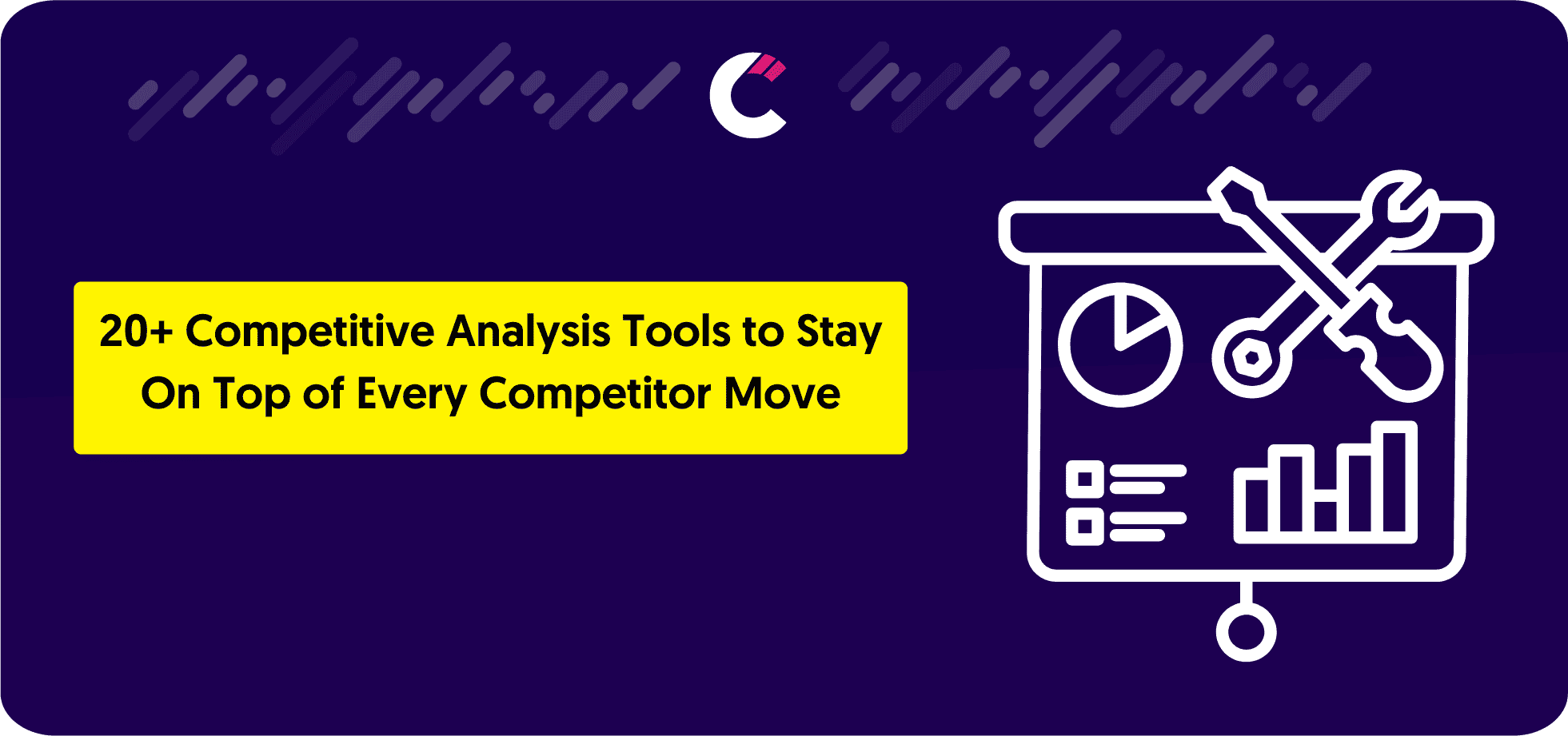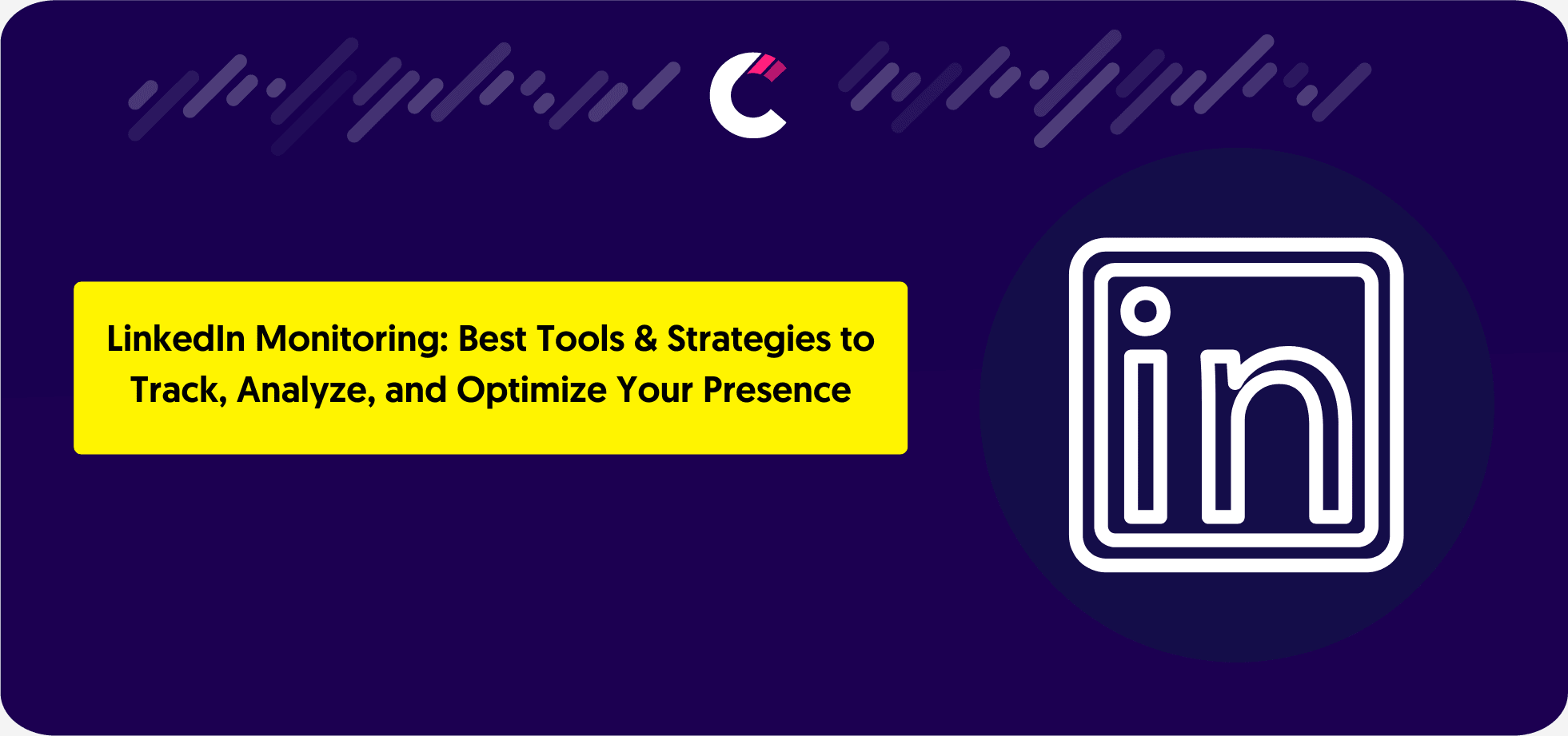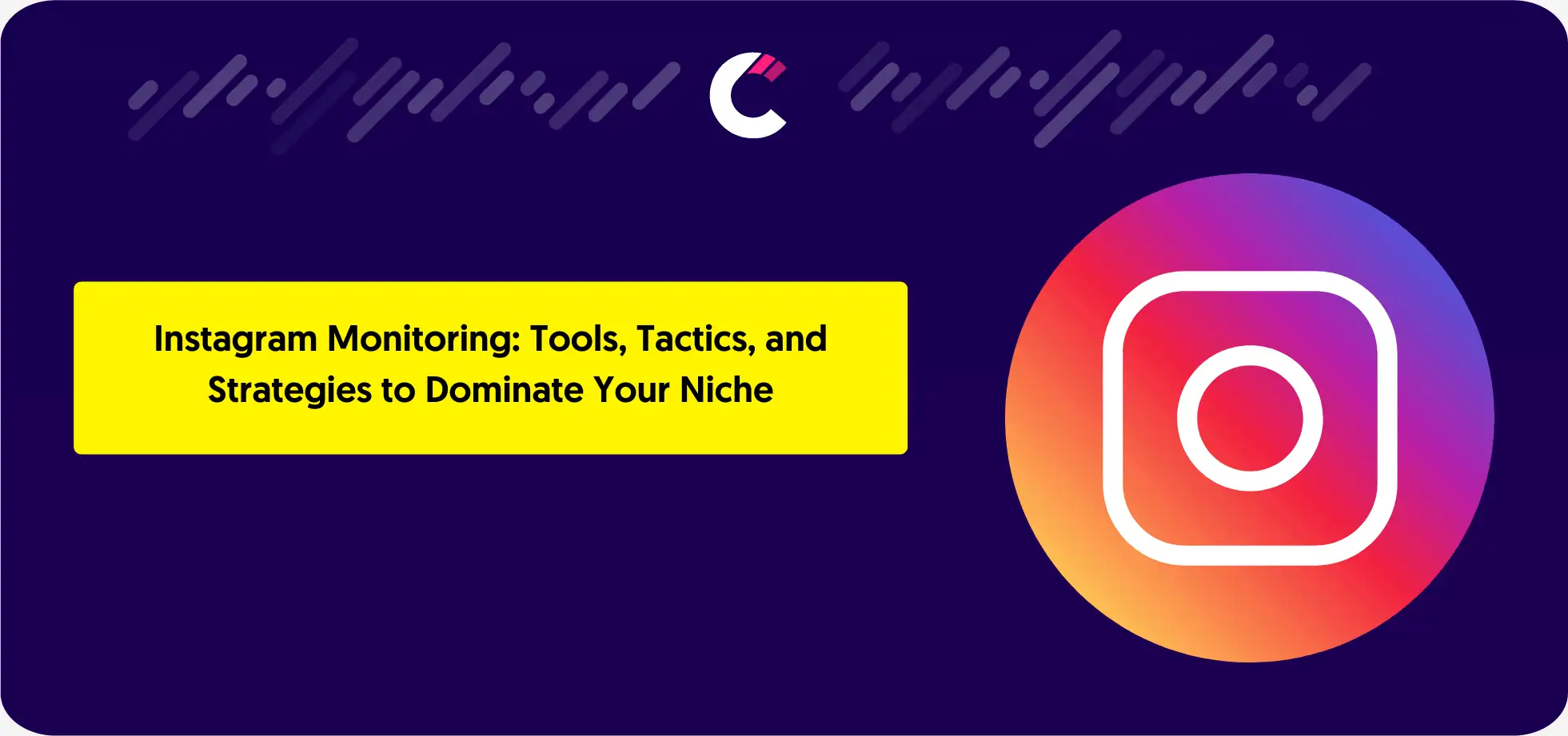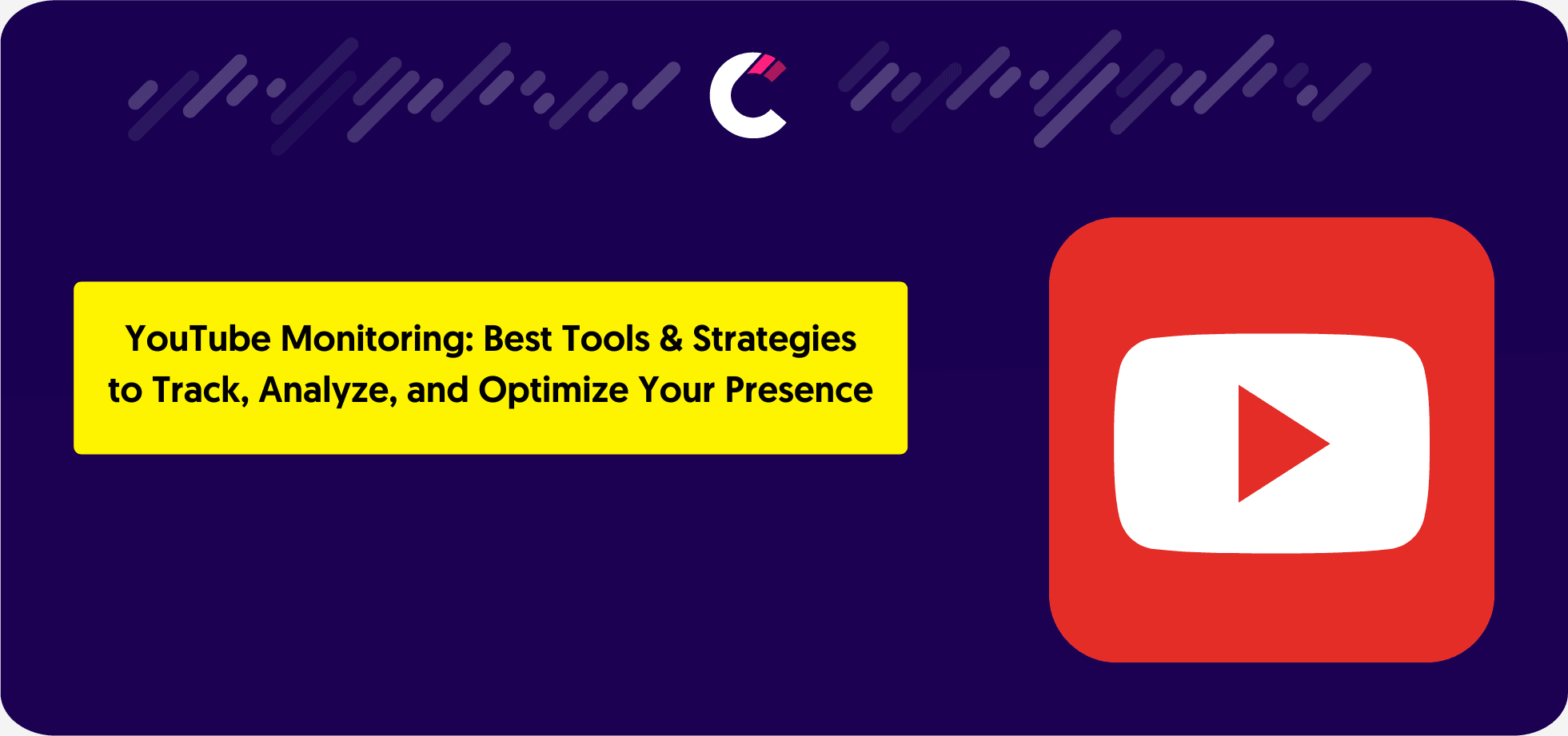If you’re not tracking your competitors, you’re already behind.
Using competitive intelligence tools isn’t a luxury anymore, it’s a must-do activity if you’re really serious about beating your competition.
They provide you with real-time insights about what your competitors are doing so you can always adapt, improve, and outperform.
We’ll break down why these tools matter, how they give you an edge, and what to consider so that you can choose the right tool for your business.
What are Competitive Analysis Tools?
Competitive analysis tools are tools that help businesses track, analyze, and understand their competitors’ strategies so that they can make better decisions
They provide you with data-driven insights about the following:
✔ Marketing campaigns: What’s working for your competitors?
✔ Products & pricing: How are they positioning themselves?
✔ Customer engagement: What’s driving their audience growth?
✔ SEO & traffic analysis: How are they getting found?
Their goal is to help you stay on top of your market changes, make smarter decisions, and always be one step ahead of your market competition.
How We Review Tools at Competitors.app
At Competitors.app, our reviews are based on thorough testing and unbiased analysis. We carefully evaluate each competitor analysis tool for features, usability, and performance. We prioritize transparency and trust, so our recommendations are impartial and reflect our team’s genuine experience.
The Best Competitor Analysis & Benchmarking Tools to Use in 2025 (per category)
Now, let’s get straight to it.
We’ve made a comprehensive list of the top competitor analysis tools in the market, categorized them by category, and reviewed each one thoroughly so that we can help you choose the right tool for your business needs.
Let’s break it down.
Competitor Analysis Tools for All-in-one Competitor Monitoring
Competitors App: All-in-one Competitor Monitoring Tool
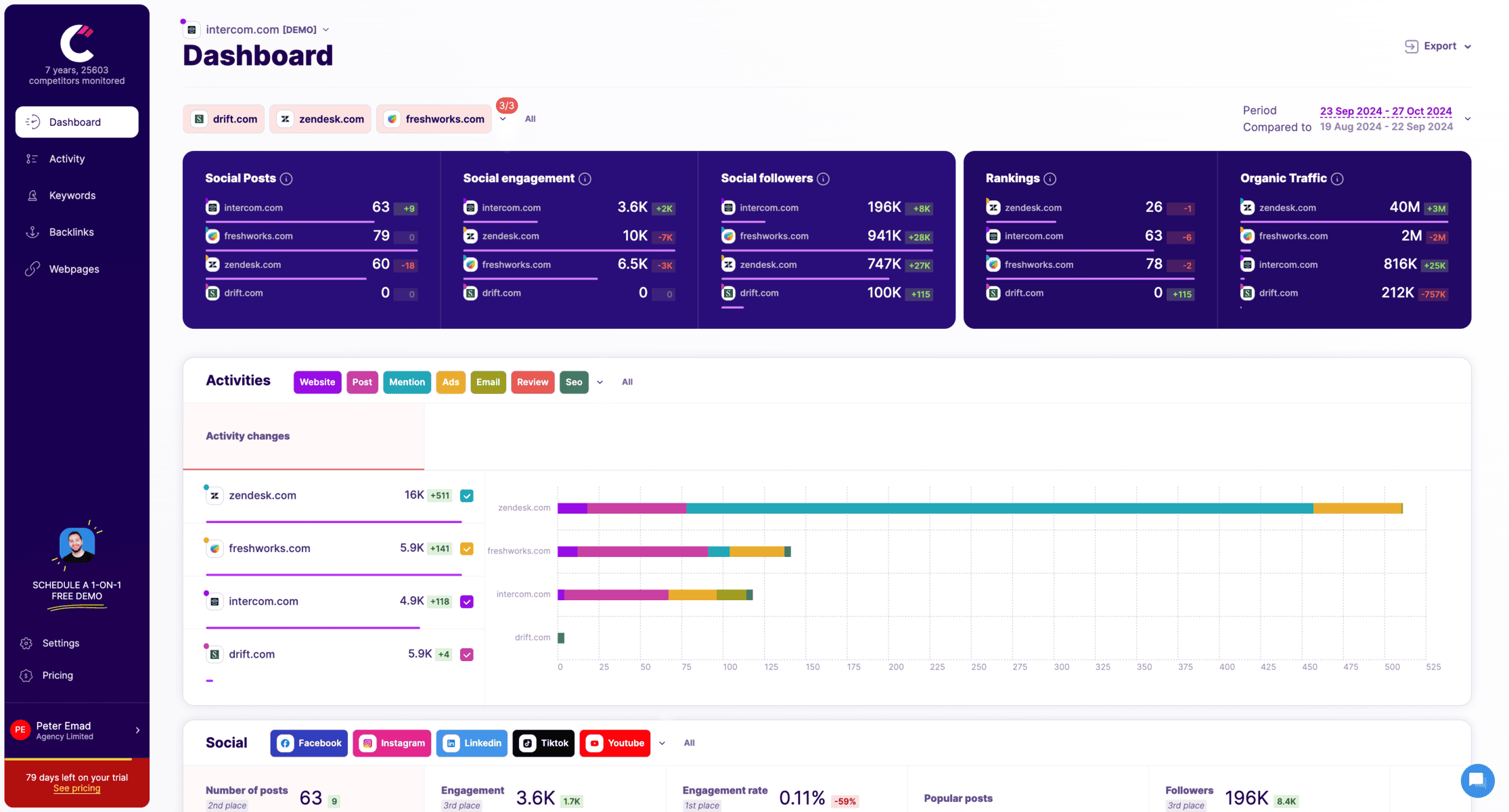
Competitor analysis is essential for staying ahead, and Competitors App makes it easy by giving you real-time insights into your competitors’ strategies and moves.
This tool is like a swiss army knife of competitors’ monitoring. It monitors everything from website changes, social media mentions, email marketing, and online ads to even SEO traffic and backlinks.
Key Features:
✔ Website & Blog Monitoring: See whenever competitors update pages, publish blogs, or launch new products.
✔ Social Media Tracking: Monitor their posts, engagement, and audience growth.
✔ Email Campaign Analysis: See how your competitors are doing in terms of email marketing.
✔ Automated Reports: Receive regular updates in your inbox with actionable insights about your competitors.
Pros & Cons
✅ What’s Great
- Automated tracking saves time, no more manual research.
- Simple, easy-to-use dashboard for quick insights.
- Helps in improving your marketing strategies with real competitor data.
❌ What to Keep in Mind
- Alerts can be overwhelming sometimes if not customized.
- Limited integration options with other marketing tools.
Pricing
Starts at $19.99/month.
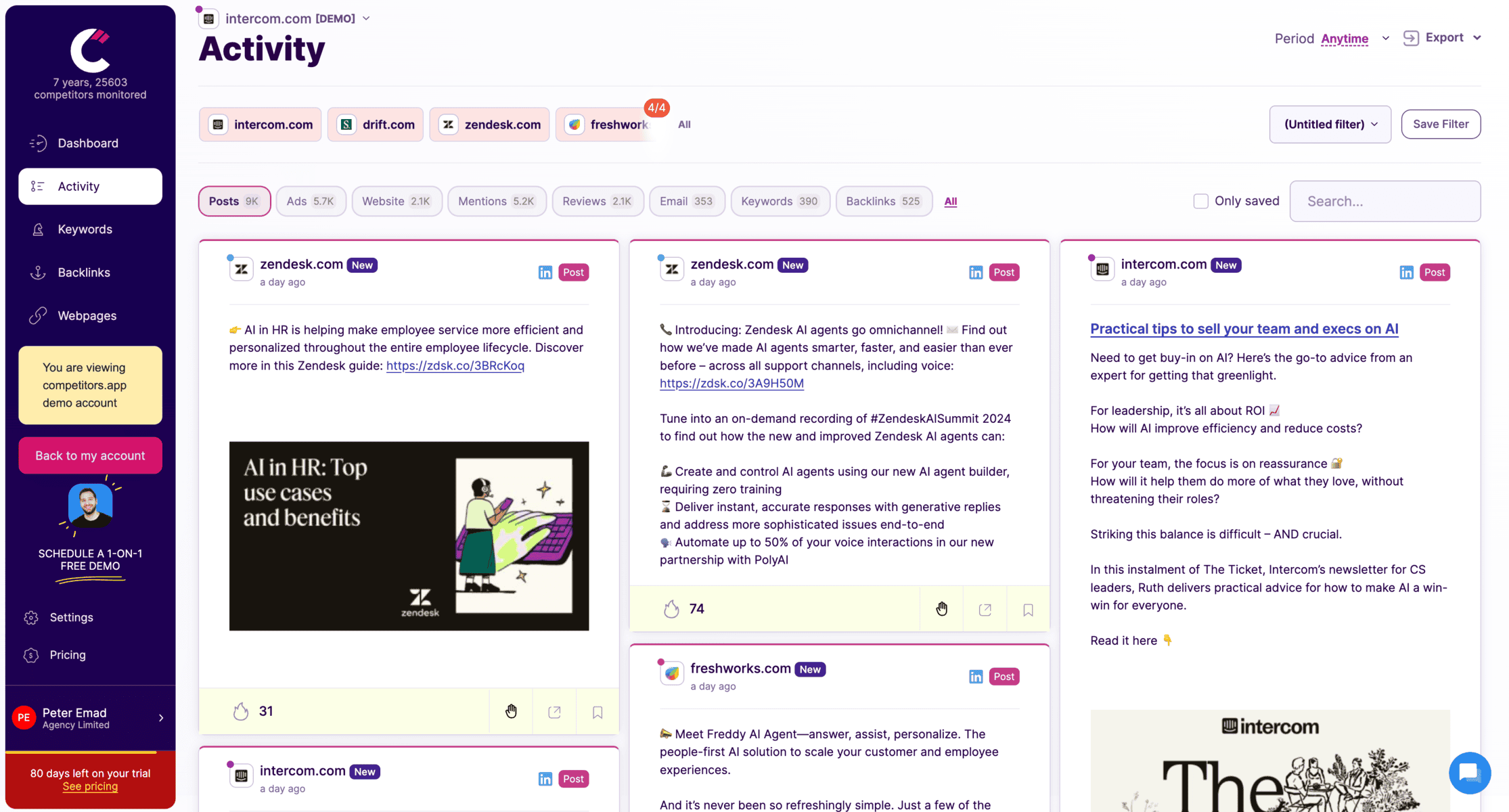
Tracks competitor social media updates across LinkedIn, Facebook, Twitter, and more.
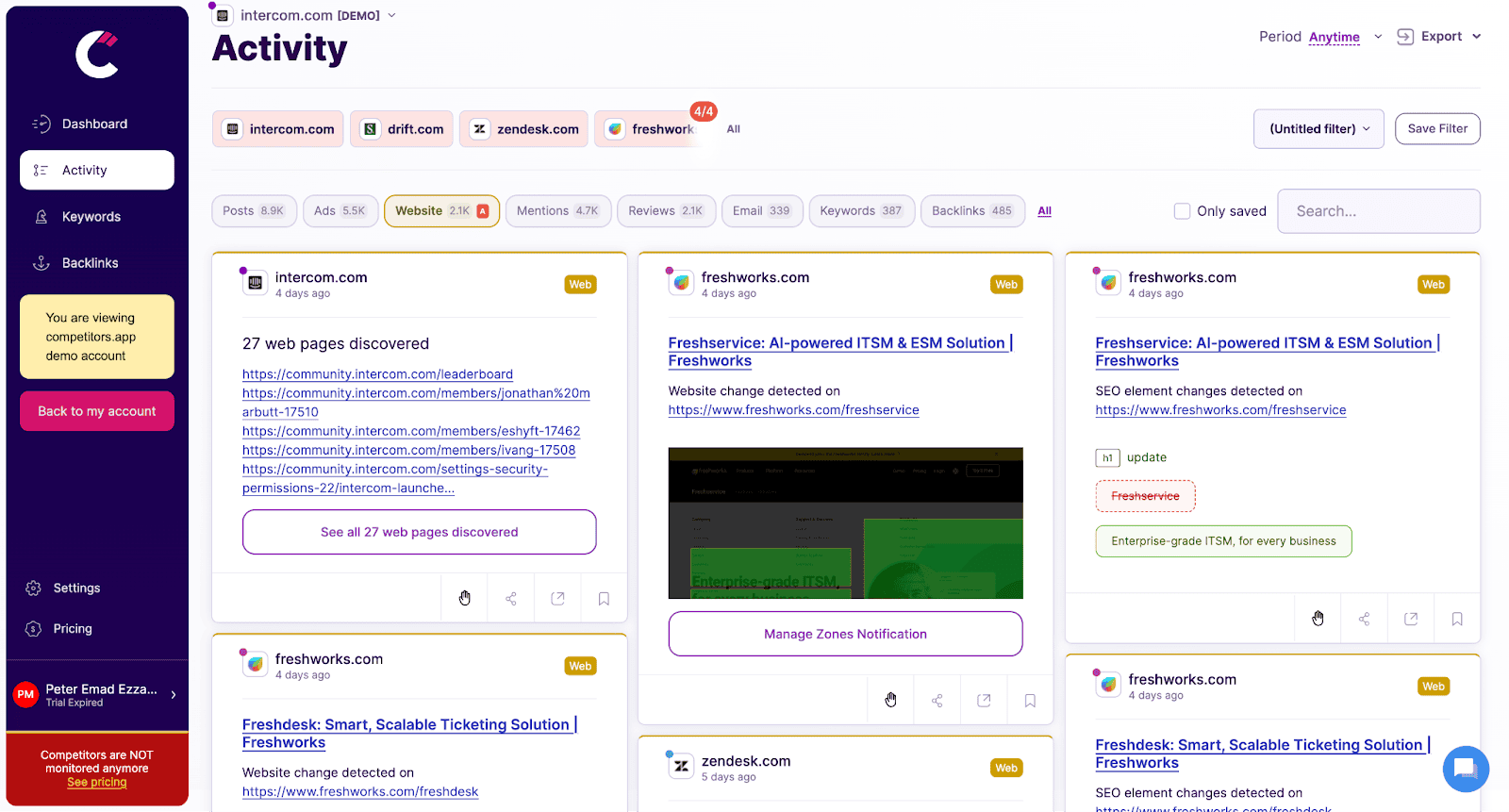
Monitors changes on competitors’ websites, such as product updates, pricing adjustments, and new messaging, providing instant alerts to help sales teams respond promptly.
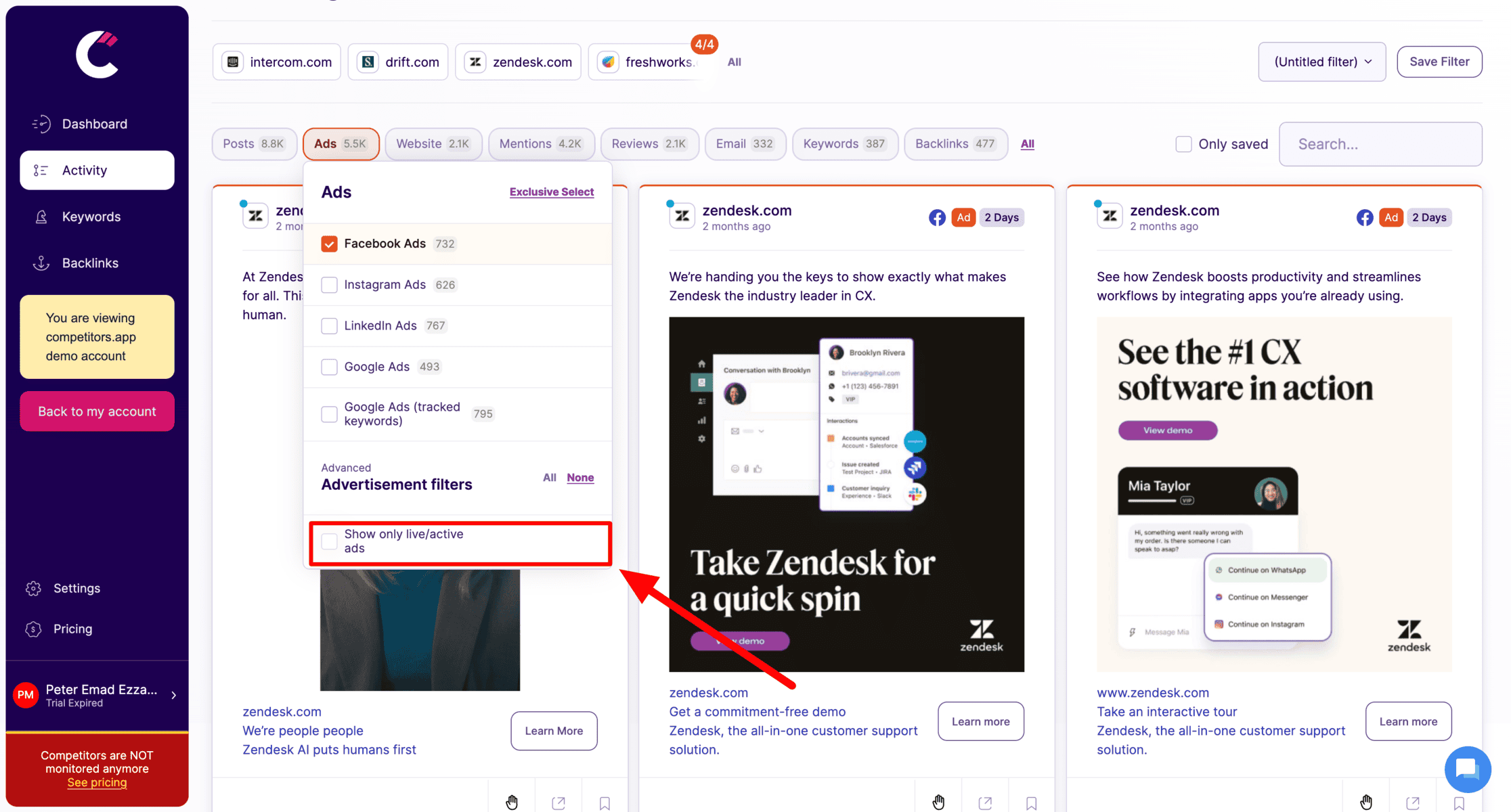
Tracks digital ad campaigns across platforms like Google Ads, Facebook, LinkedIn, and Instagram. It provides details on ad creatives, spending, and performance metrics, helping teams analyze successful ad strategies.

Analyzes competitors’ keyword strategies, organic rankings, and backlinks, allowing teams to refine their own SEO tactics and boost search visibility.
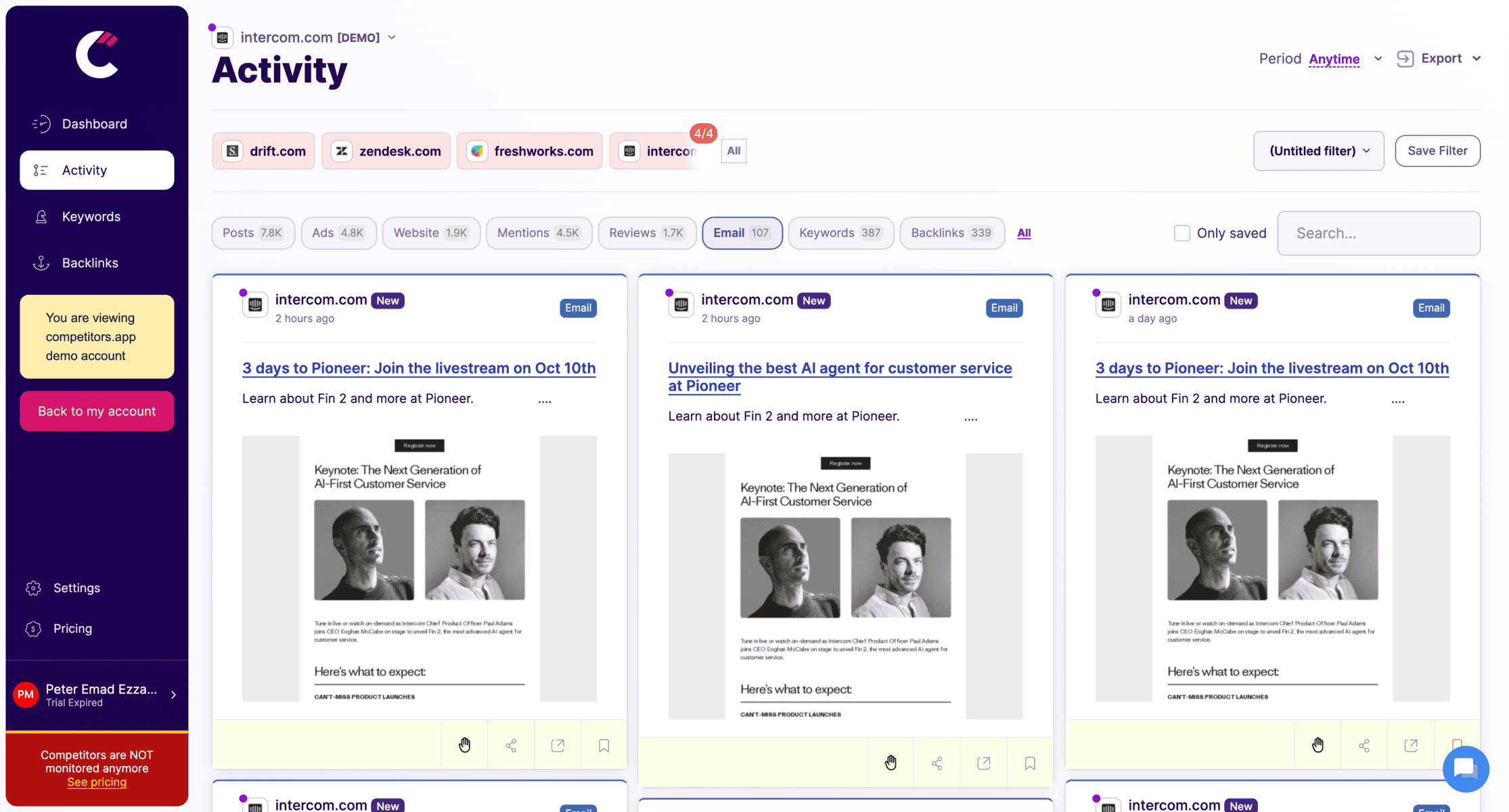
Tracks competitors’ email campaigns, including content, frequency, and engagement metrics, helping sales teams understand email tactics that drive engagement and conversions.
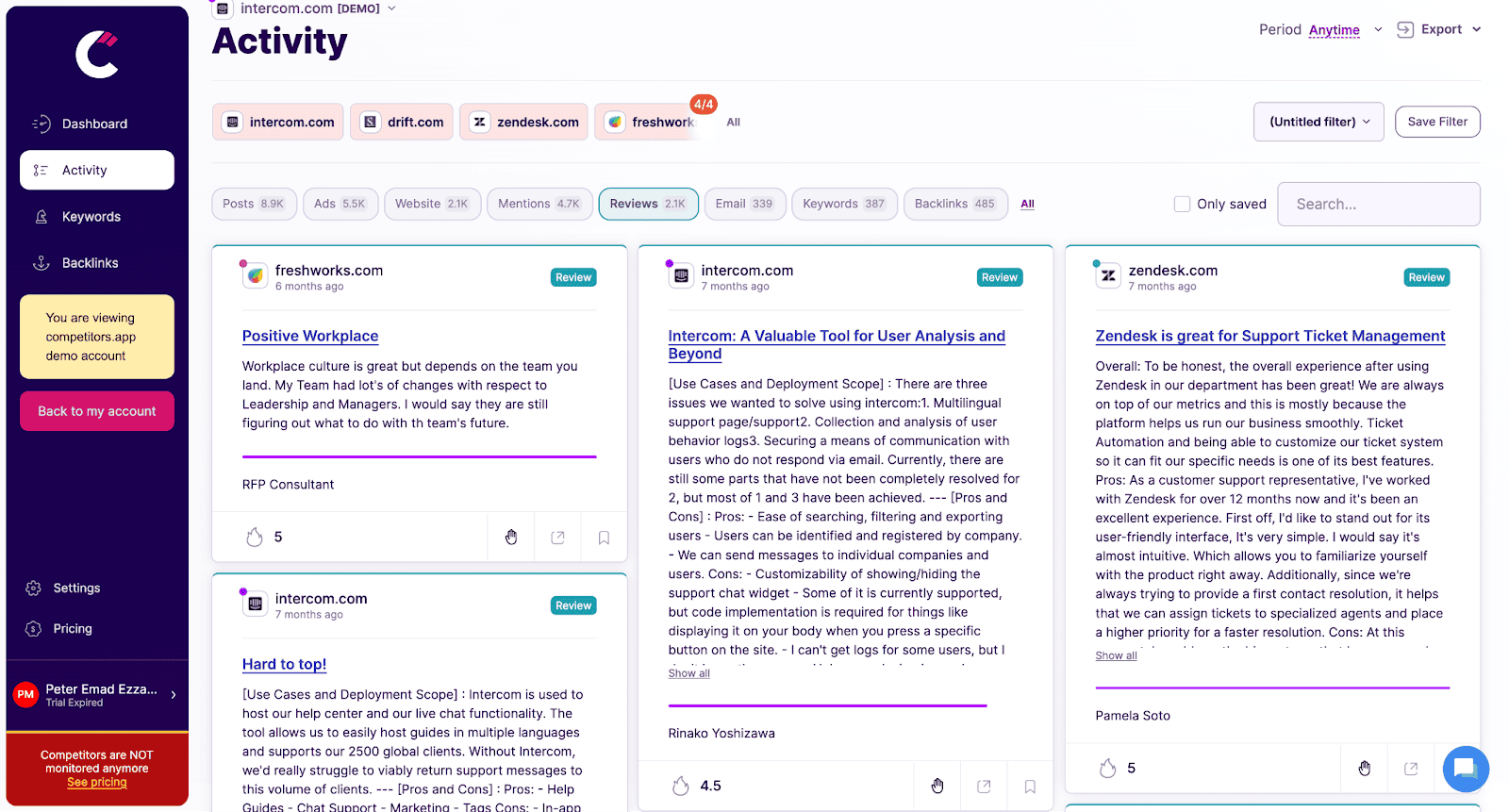
Analyzes customer reviews and ratings for competitors, providing insights into customer feedback, pain points, and product strengths, helping teams craft better sales pitches.
Crayon
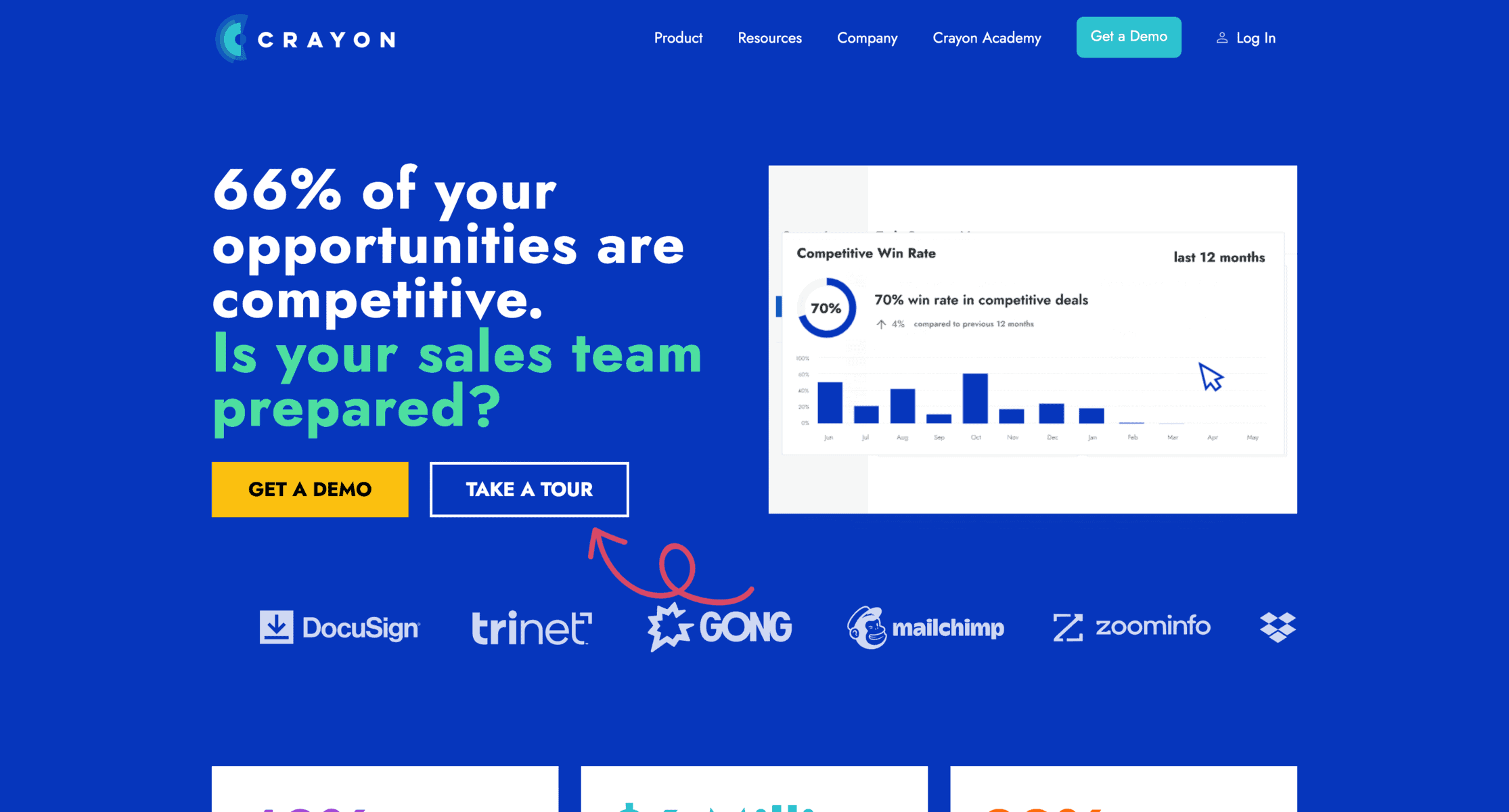
Crayon provides real-time competitive intelligence which helps businesses track competitor moves as they happen.
It monitors things like pricing changes, product launches, and marketing strategies, which makes it easier to adjust tactics accordingly.
One of its very unique features is battlecards, which provide the sales teams with the insights they need to position their offerings more effectively against their competitors.
Key Features
✔ Real-time competitive intelligence: Track pricing, product, and marketing updates
✔ Battlecards for sales teams: Access competitor insights during deal negotiations
✔ Competitor strengths and weaknesses analysis: Identify market advantages and threats
Pricing: Custom (Contact for details)
Klue
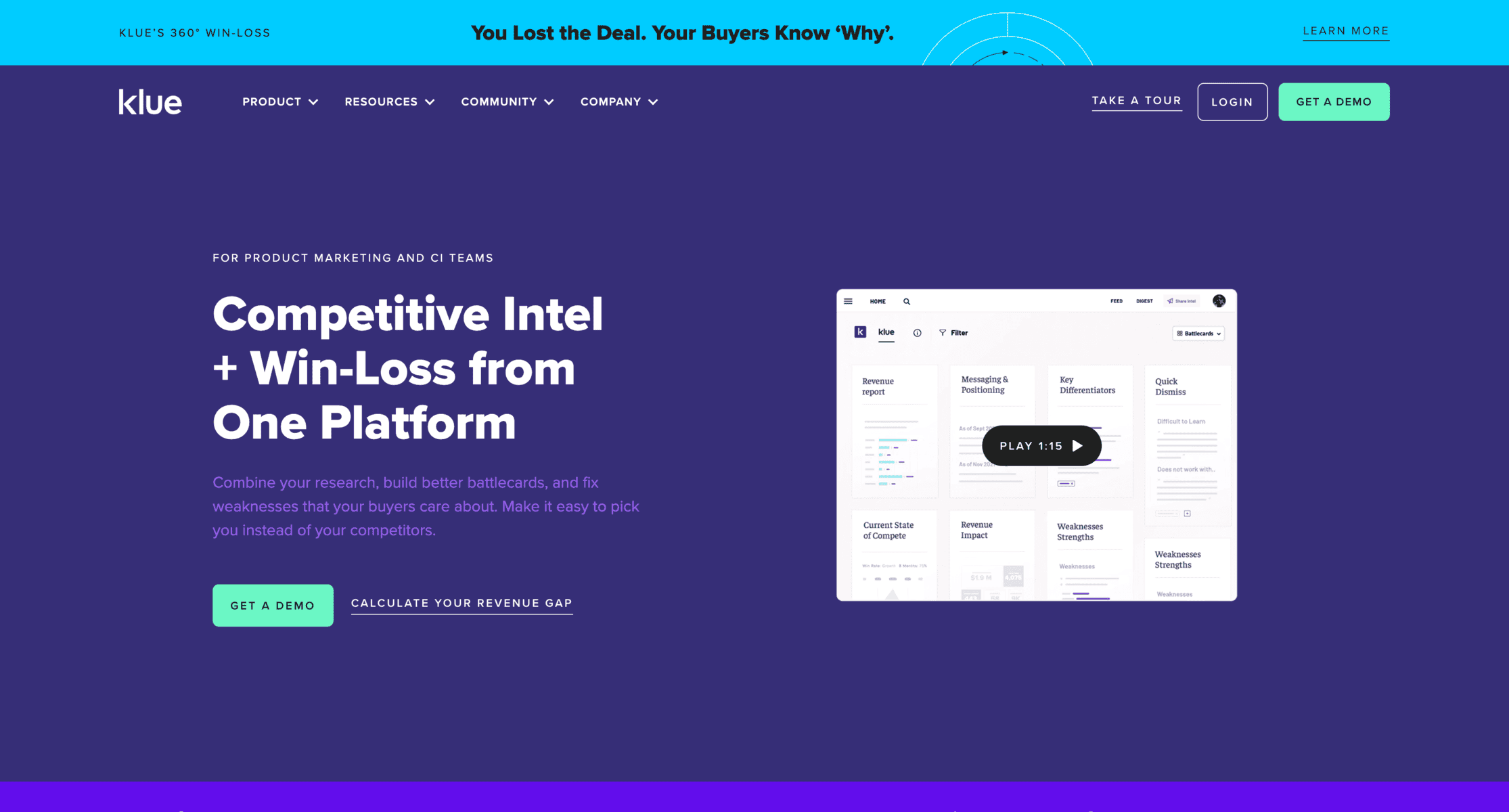
Klue is built for businesses that need a centralized system to track and share competitive intelligence across teams.
It monitors product launches, pricing shifts, and go-to-market strategies.
Similar to Crayon, Klue also offers battlecards and real-time alerts about the competition that helps your team stay updated on competitor activity and make better decisions.
Key Features
✔ Sales battlecards: Provide teams with competitor insights to improve positioning
✔ Competitive intelligence alerts: Get real-time updates on competitor moves
✔ Collaborative insights: Organize and share intelligence across multiple departments
Pricing: Custom (Contact for details)
Kompyte
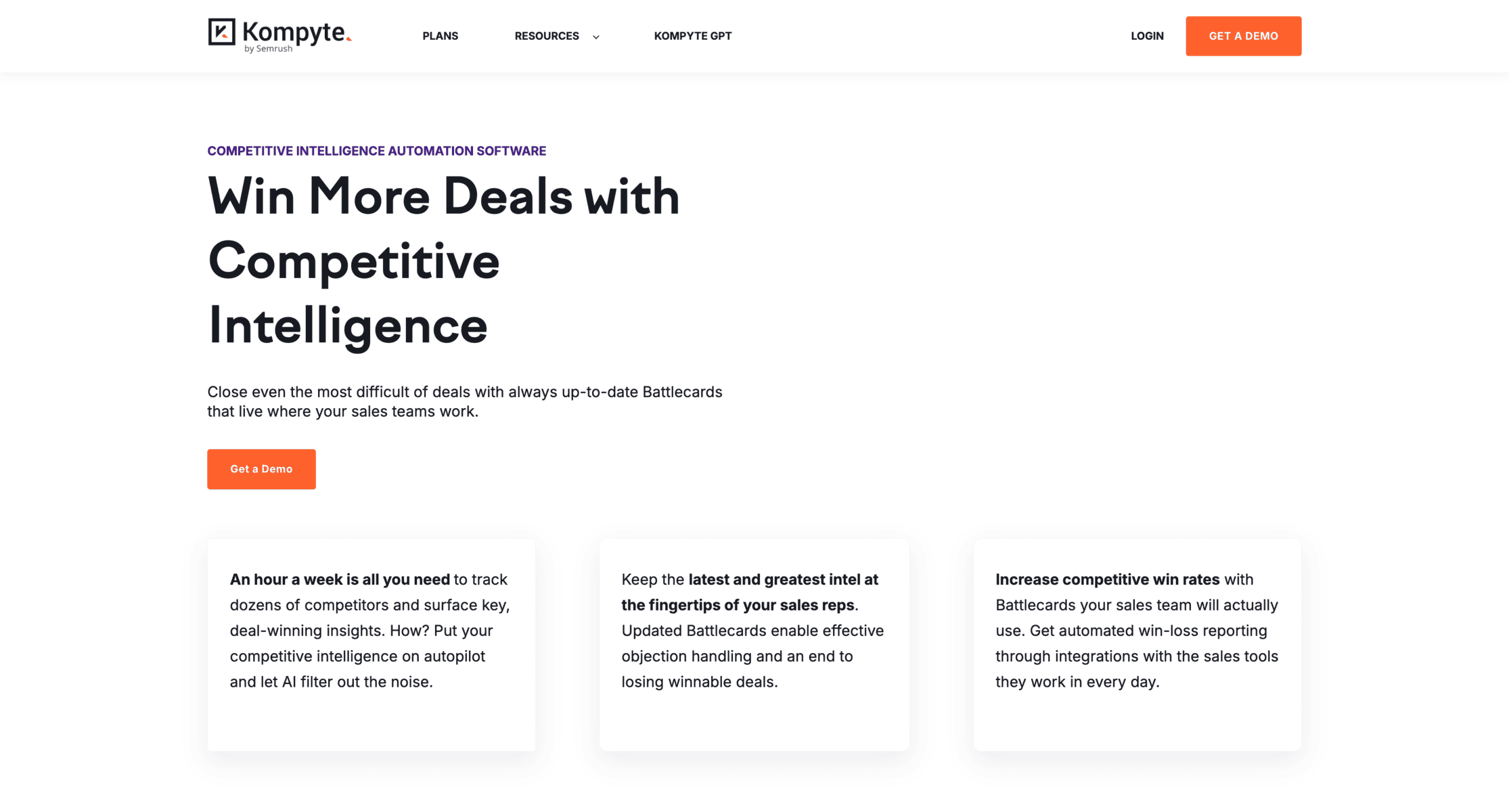
Kompyte is a competitive intelligence tool built for tracking digital marketing strategies across content, advertising, as well as SEO.
It provides real-time information on how your competitors are doing across multiple channels.
Key Features
✔ Digital marketing campaign tracking: Monitor competitors’ paid and organic marketing efforts
✔ Content analysis: Identify which topics and formats are driving engagement
✔ Ad campaign monitoring: Track competitors’ advertising strategies and placements
✔ SEO strategy insights: Analyze keyword rankings and optimization trends
Pricing: Custom (Contact for details)
Best Competitor Analysis tool for SEO
SEMRush
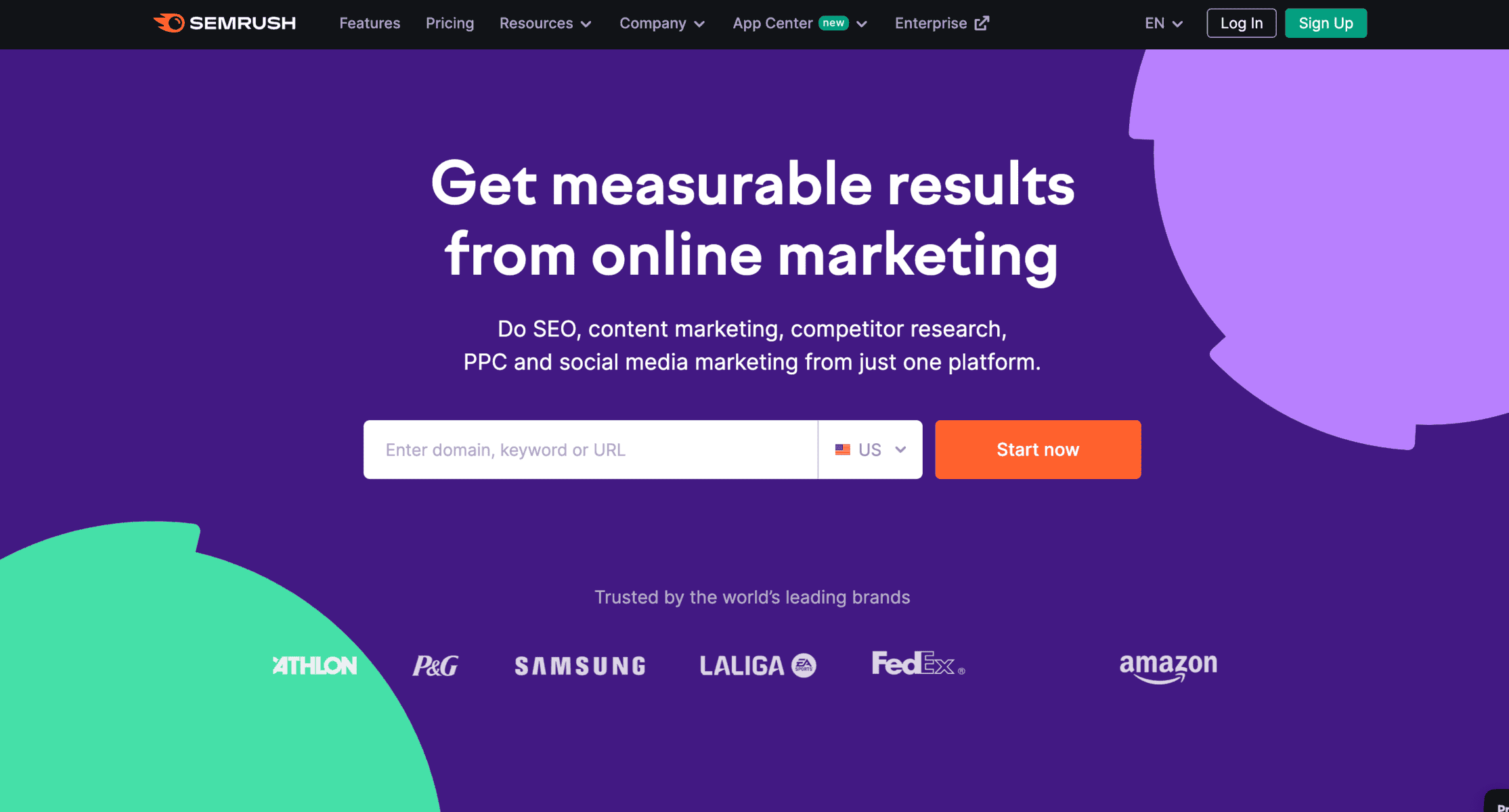
SEMRush is my go-to tool for competitive keyword analysis because of how much historical ranking data it provides. One of my favorite features is the Keyword Gap tool, which shows exactly which keywords my competitors rank for that I don’t,this alone has helped me discover high-value search terms I was missing out on.
The Competitive Domain Analysis is another feature I use often. I’ve compared multiple competitors side by side and found exactly where they were gaining traffic, which backlinks were driving results, and how their rankings changed over time. The backlink data is good, though Ahrefs is still better in that area.
Where SEMRush really shines is on-page SEO auditing. The tool doesn’t just flag issues,it prioritizes them based on impact, so I know what to fix first to get the fastest ranking improvements.
Favorite Feature: Keyword Gap tool: Quickly uncovers ranking opportunities by showing where competitors have the edge.
Key Features
✔ Keyword research & tracking: Track competitors’ rankings over time
✔ Backlink analysis: See which sites link to your competitors
✔ Domain authority & competitive benchmarking: Compare your site’s strength to others
✔ Comprehensive SEO audits: Prioritized recommendations to improve rankings
Pricing: Starts at $139.95 per user
Ahrefs

Ahrefs is the only tool I fully trust for backlink research.
I’ve tested almost every SEO tool on earth, and nothing beats Ahrefs’ backlink database in terms of accuracy and depth.
My favorite feature is the “Best by Links” report, it instantly shows you which competitor pages have attracted the most backlinks.
You can use this feature to reverse-engineer your competitors’ content marketing strategies, create better content, and get backlinks from the same sources.
Ahrefs’ Site Explorer is another tool that I just can’t live without.
It gives you a full breakdown of the backlinks, referring domains, and even lost links, so I can see if a competitor is losing or getting more authority over time.
Key Features
✔ Backlink analysis: The most accurate backlink database available
✔ Keyword research & tracking: Discover high-performing keywords
✔ Site audit & SEO optimization: Identify and fix ranking issues
✔ Competitor SEO analysis: Compare traffic, backlinks, and rankings
Pricing: Starts at $129 per month
Moz

Moz was one of the first SEO tools I ever used, and it’s still a solid option for those who want an easy-to-use platform with reliable keyword and domain authority metrics.
The Keyword Explorer is my favorite feature because it doesn’t just show keyword difficulty, it also predicts organic CTR (click-through rate) which helps me pick keywords that will actually bring in more traffic, not just rankings.
Moz’s Domain Authority (DA) metric is something I use when evaluating competitors. While we know that Google doesn’t officially use DA as a ranking factor, it’s still useful to quickly compare how strong a competitor’s website is compared to my website.
While Moz’s backlink database isn’t as deep as Ahrefs, it still does a great job with site audits, flagging SEO issues and suggesting fixes in a way that’s easy to understand.
Key Features
✔ Keyword tracking & rank monitoring: Easy-to-use keyword insights
✔ Site audits: Pinpoint SEO issues and fix them
✔ Competitor comparison & domain analysis: Compare domain authority and keyword performance
Pricing: Starts at $99 per month
Ubersuggest
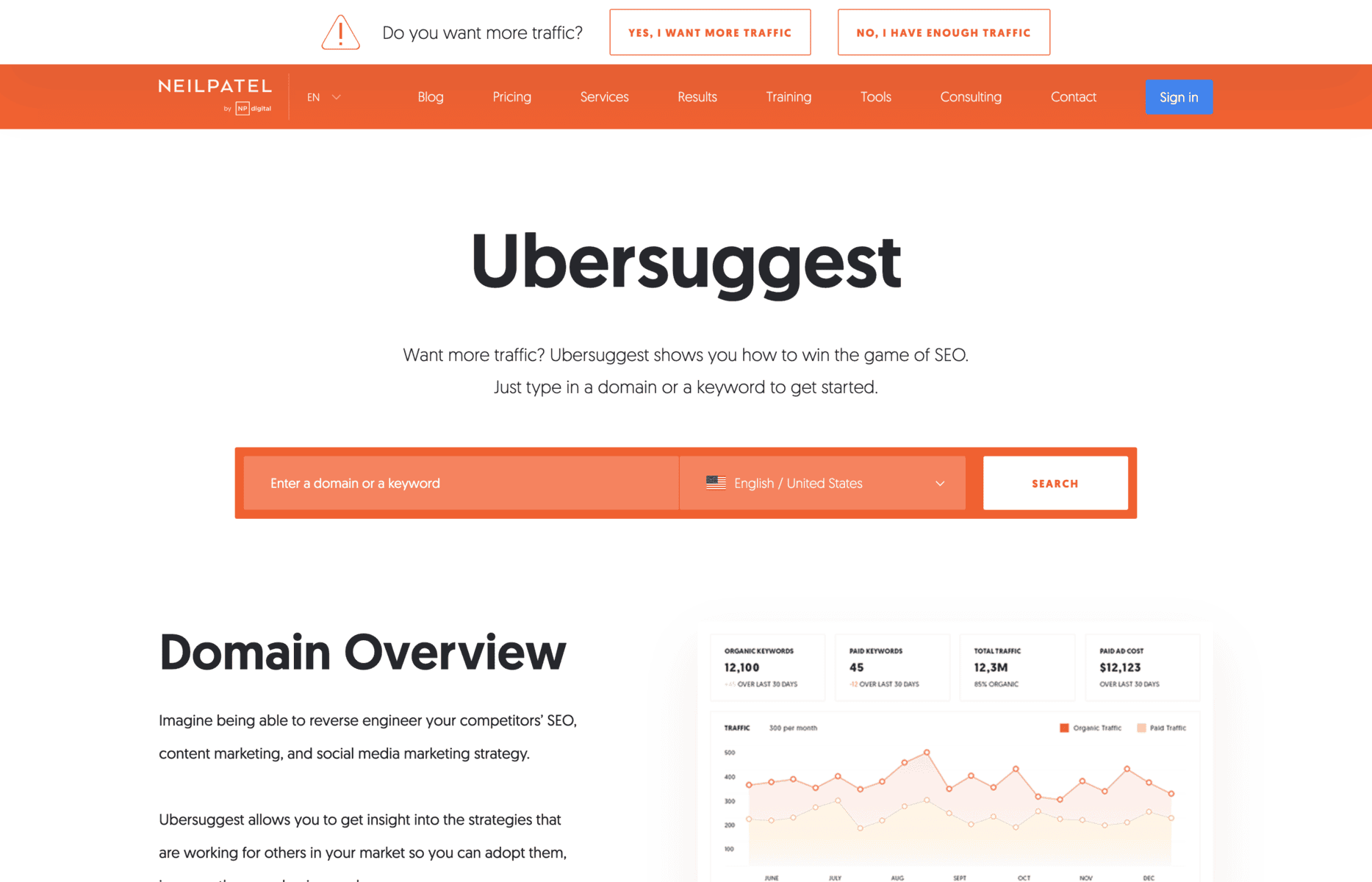
Ubersuggest is the best budget-friendly SEO tool I’ve used, especially for small businesses and beginners who don’t need advanced competitor tracking.
My favorite feature is the Content Ideas tool, which shows the most shared and linked-to content on any given topic. I’ve used this when brainstorming blog posts and found content gaps that competitors hadn’t fully capitalized on.
Ubersuggest’s SEO audit tool is also solid for quick fixes, it doesn’t have the depth of SEMRush, but it’s great for a fast overview of what’s holding a website back. The keyword research tool is simple and effective, though it lacks the historical depth of SEMRush and Ahrefs.
Key Features
✔ Keyword research & tracking: Basic but effective keyword insights
✔ Backlink analysis: Entry-level competitor backlink tracking
✔ Site audits & SEO recommendations: Quick SEO fixes for small sites
✔ Competitor analysis & domain comparison: See how your site compares to competitors
Pricing: Starts at $12 per month
Competitor Analysis Tools for Social Media
Sprout Social
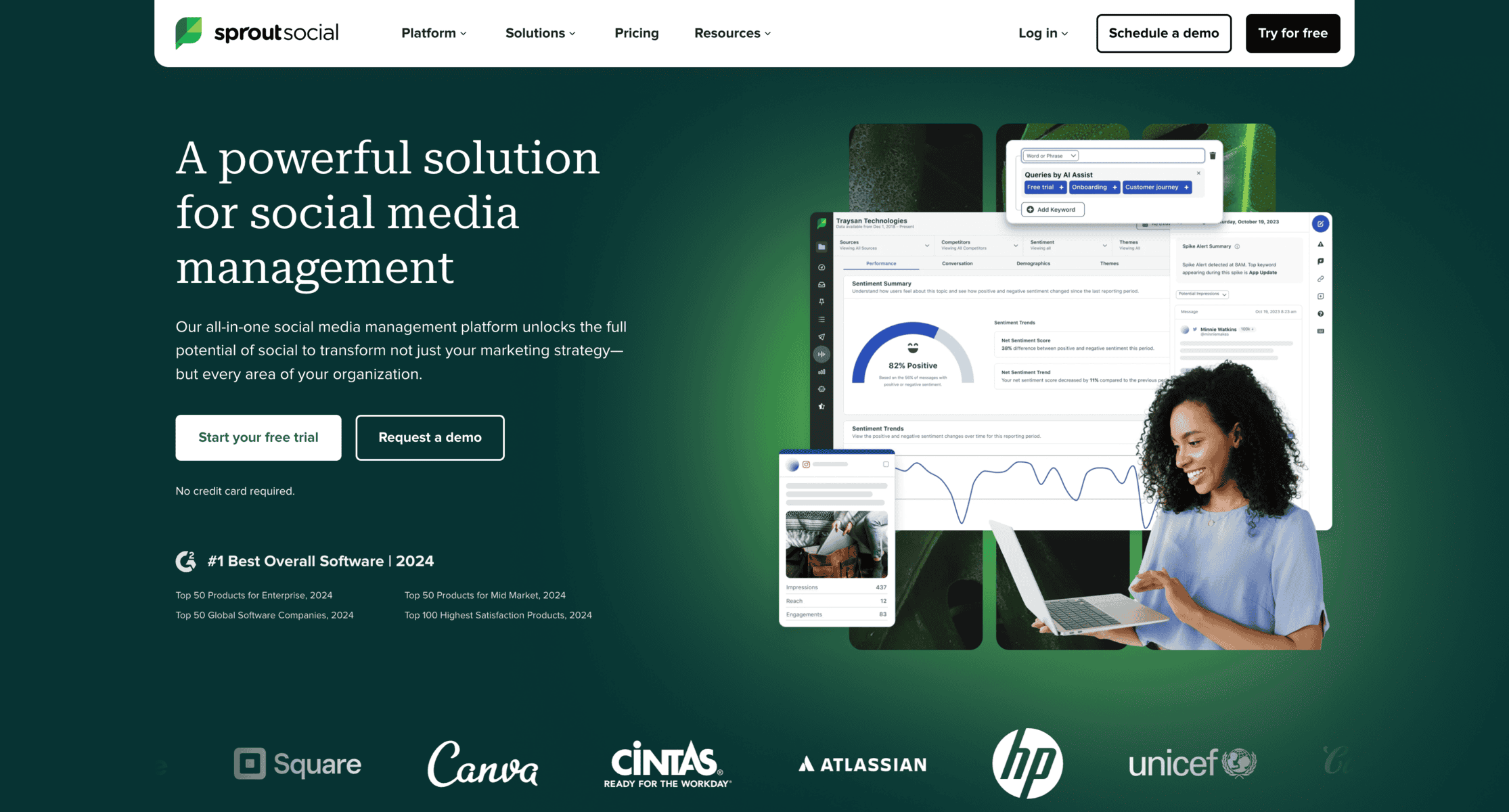
I’ve used a lot of social media tools, and Sprout Social always stands out when it comes to competitor tracking.
Unlike most platforms that focus only on scheduling and engagement, Sprout takes it a step further and gives you real data on what’s working for competitors, which posts get the most interaction, how often they post, and even how their audience is growing.
One thing I found useful is its content strategy assessment. Instead of just showing numbers, it breaks down which topics and formats drive the most engagement which makes it easier for me to adjust my own content strategy based on competitor success.
Other than this, Sprout Social also includes social listening tools, which help track industry trends and see what customers are saying about competitors.
Key Features
✔ Social media performance tracking: Compare engagement, reach, and audience growth
✔ Content strategy assessment: Identify which posts are driving results for competitors
✔ Audience engagement insights: Understand how competitors interact with their followers
✔ Social listening capabilities: Monitor brand mentions and industry discussions
✔ Competitor post monitoring: Track how often and when competitors post
Pricing: Starts at $249/month, with additional users at $199/month
Buffer
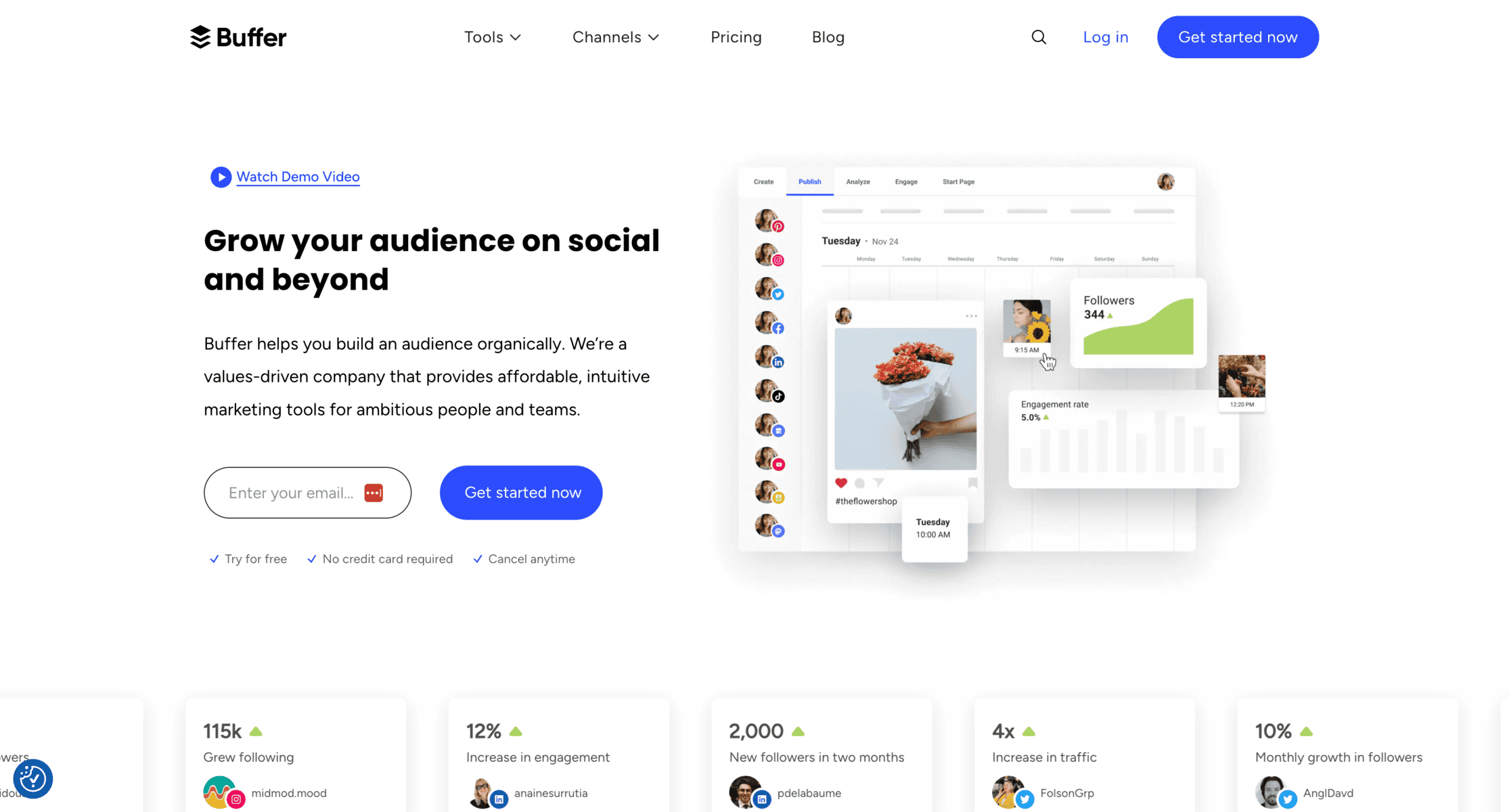
When I first started managing social media, Buffer was my go-to tool for scheduling posts. It’s simple, clean, and doesn’t overwhelm you with unnecessary features.
But what a lot of people don’t realize is that Buffer also offers competitor insights, it’s not just about posting; it’s about knowing how your content stacks up.
The engagement and reach analytics helped me compare my social media performance with competitors, showing me where my posts were underperforming and what adjustments I needed to make.
Buffer doesn’t have in-depth competitor research like Sprout Social, but it’s still a great lightweight option for tracking basic competitor performance.
Key Features
✔ Social media post scheduling and management: Automate content publishing
✔ Engagement and performance tracking: Monitor likes, shares, and comments compared to competitors
✔ Competitor content comparison: See how your posts stack up against industry leaders
✔ Analytics for audience growth and reach: Track follower trends over time
Pricing: Starts at $6 per month
Online Competitor Analysis Tools for PPC
SpyFu
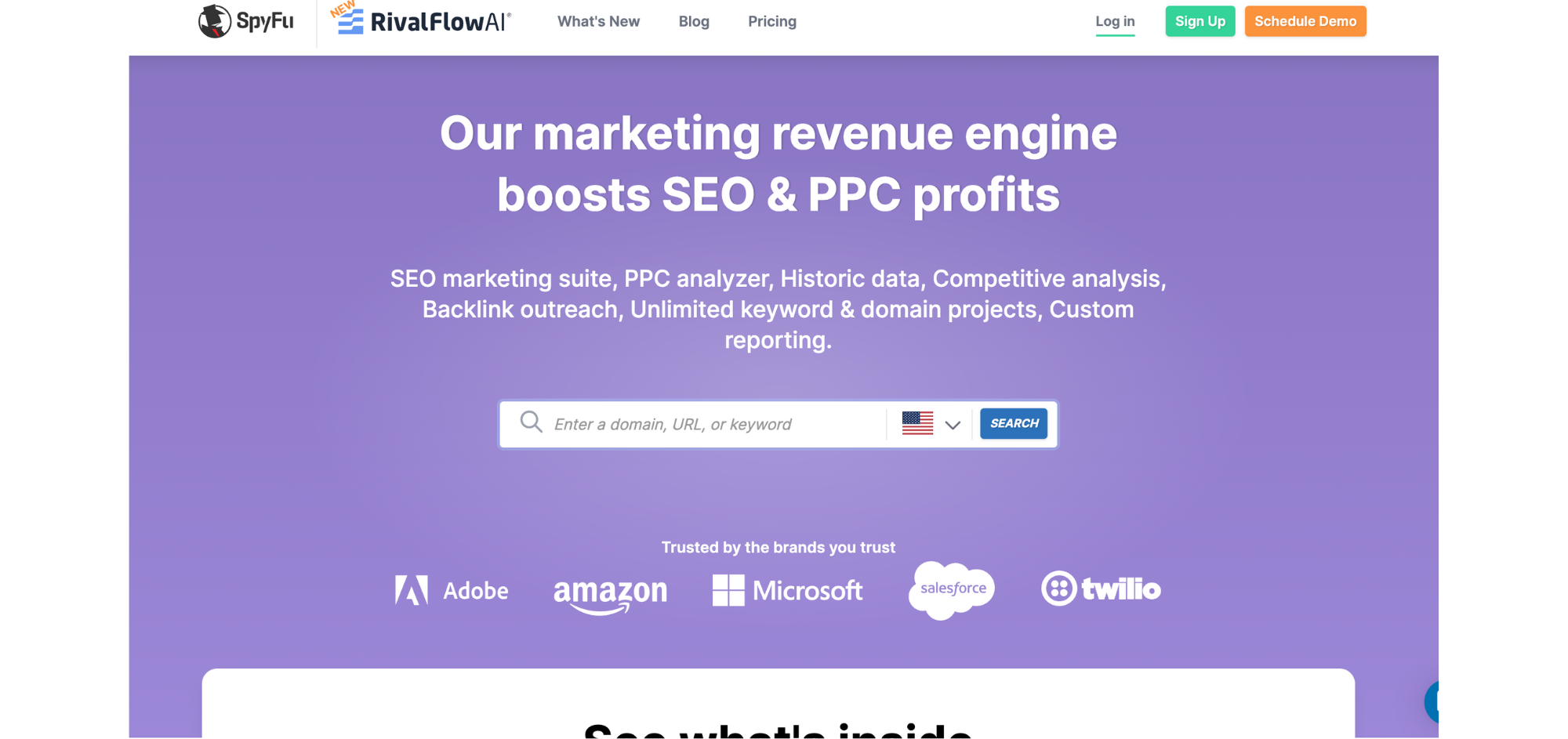
I first used SpyFu when I needed to reverse-engineer a competitor’s Google Ads strategy, and it completely changed how I approached PPC. It doesn’t just show what keywords competitors are bidding on, it does reveal how much they’re spending, what their ad copy looks like, and how long they’ve been running specific campaigns.
One of my favorite discoveries was using SpyFu’s historical data to track trends in my competitors’ ad performance. If a competitor dropped a keyword after months of bidding on it, it usually meant it wasn’t converting well, which helps me avoid wasting my budget on the wrong search terms that didn’t work for my competitors.
Key Features
✔ Ad campaign analysis: See what PPC strategies competitors are using
✔ Keyword research: Discover the highest-performing paid search keywords
✔ Ad copy examination: Analyze which headlines and descriptions drive the most clicks
✔ Competitor keyword tracking: Monitor changes in competitor keyword strategy over time
Pricing: Starts at $39 per month
WordStream
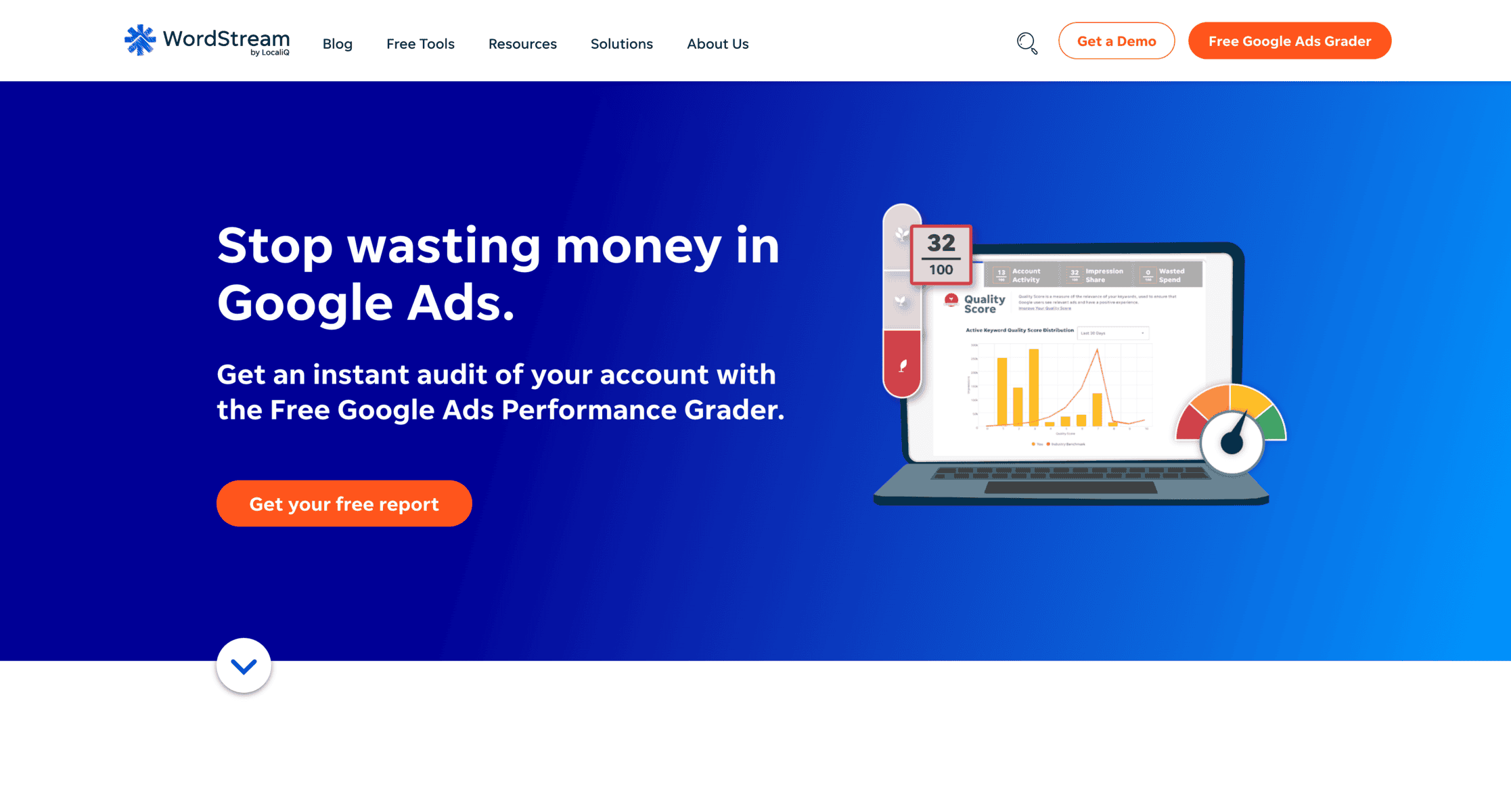
I always struggled with balancing ad spend and conversion rates in PPC campaigns.
That’s where a tool like WordStream did help, it not only tracks competitor PPC performance but also gives automated recommendations on how to improve your own campaigns.
The Google Ads keyword tracking helped me figure out which search terms competitors were dominating and where I could bid more effectively.
I also liked how WordStream’s reports showed which competitors were making aggressive bidding moves, helping me stay ahead in competitive auctions.
Key Features
✔ Google Ads keyword research and analysis: Find competitor PPC keywords
✔ Competitor PPC performance tracking: Analyze which ads and keywords are driving the most traffic
✔ Campaign optimization recommendations: Get automated suggestions to refine your PPC strategy
✔ Automated reporting and campaign management: Track changes in ad performance over time
Pricing: Starts at $49 per month
AdEspresso
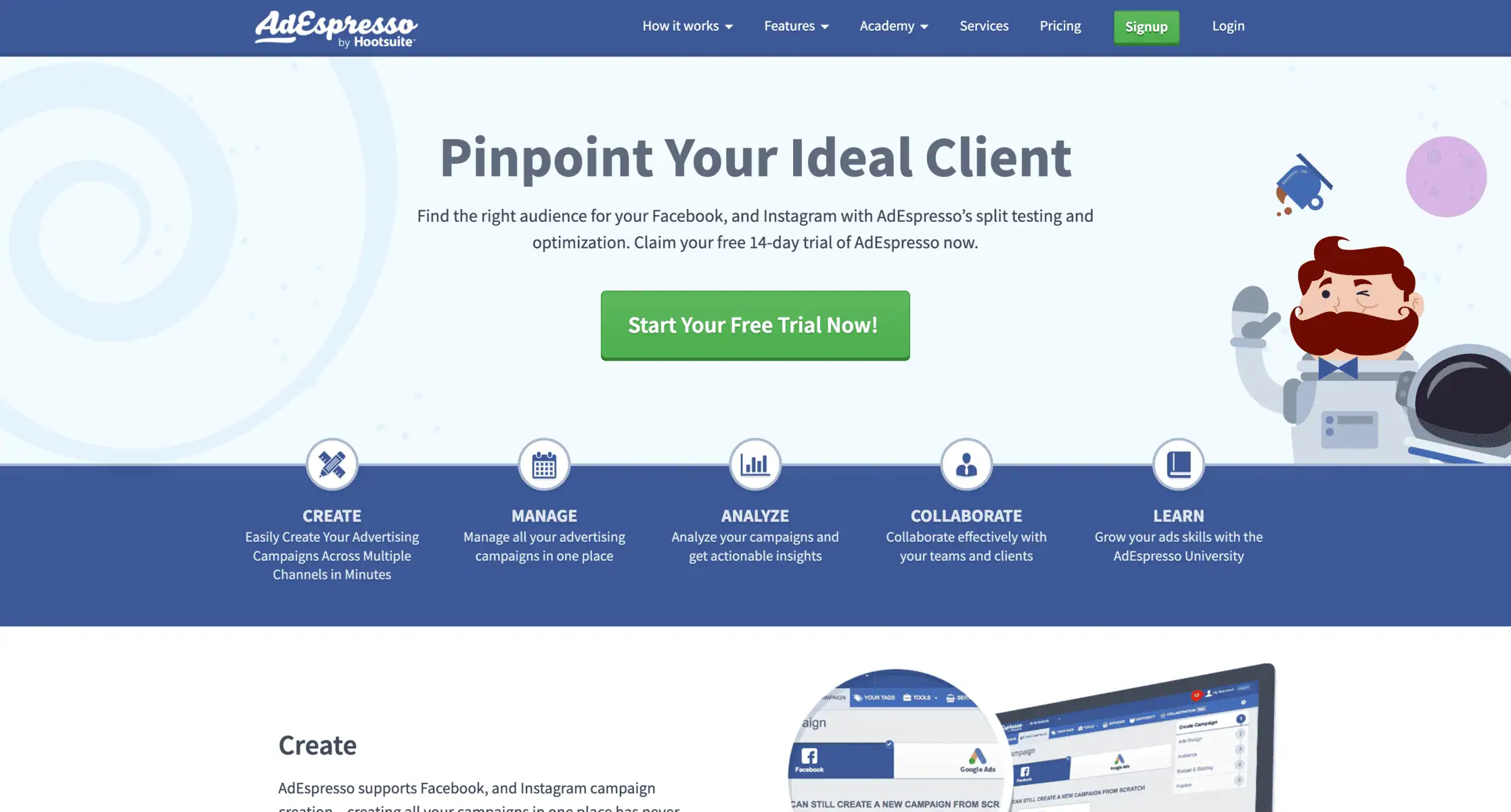
I had no idea how to track what competitors were doing when I first started running Facebook Ads. That’s why I started using a tool like AdEspresso, it lets you see exactly how competitors are structuring their ads, what kind of engagement they’re getting, and which targeting strategies they’re using.
One of the best parts is A/B testing. AdEspresso helped me test different ad creatives and targeting variations, which made it easier to optimize my budget and improve conversion rates.
Key Features
✔ Facebook Ads competitor tracking: Monitor how competitors structure their ad campaigns
✔ Ad performance analysis and insights: Compare ad engagement and effectiveness
✔ Competitor targeting strategy insights: See how competitors are segmenting their audiences
✔ A/B testing for ad optimization: Test different ad variations for better conversion rates
Pricing: Starts at $49 per month
Competitor Analysis Tools for Email Tracking
Mailcharts
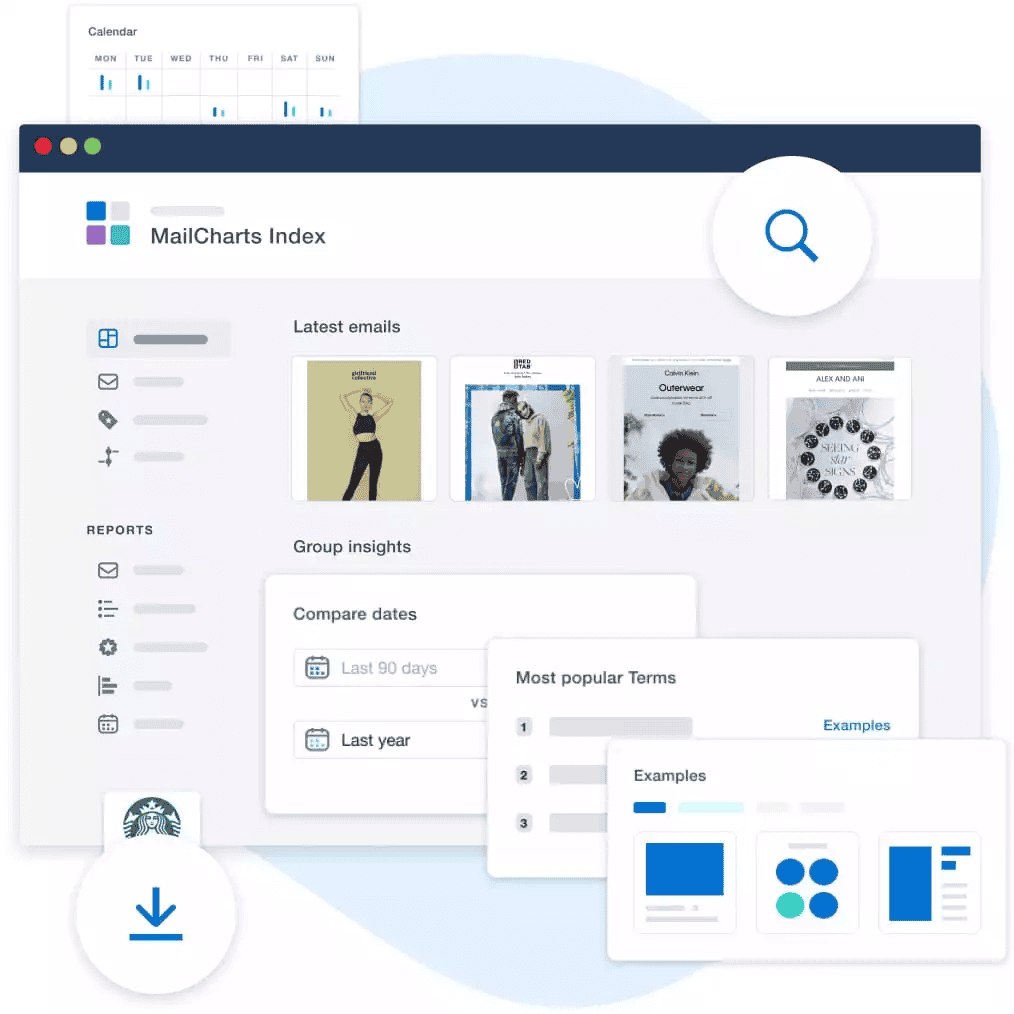
I use Mailcharts whenever I need to track how competitors structure their email campaigns. It provides insights into sending frequency, subject line strategies, and design trends, helping refine my own email marketing approach. The competitor benchmarking feature is really useful which allows me to compare my email performance to industry standards and see where I need to improve.
Key Features
✔ Email campaign tracking: Monitor competitor email frequency and structure
✔ Content analysis: Compare subject lines, CTAs, and formatting styles
✔ Delivery strategy insights: Identify sending times and segmentation approaches competitors use
✔ Audience engagement data: Analyze how well competitor emails perform
✔ Competitor email benchmarking: See how campaigns compare to industry leaders
Pricing: Starts at $149/month, with additional users at $49/month
SendView
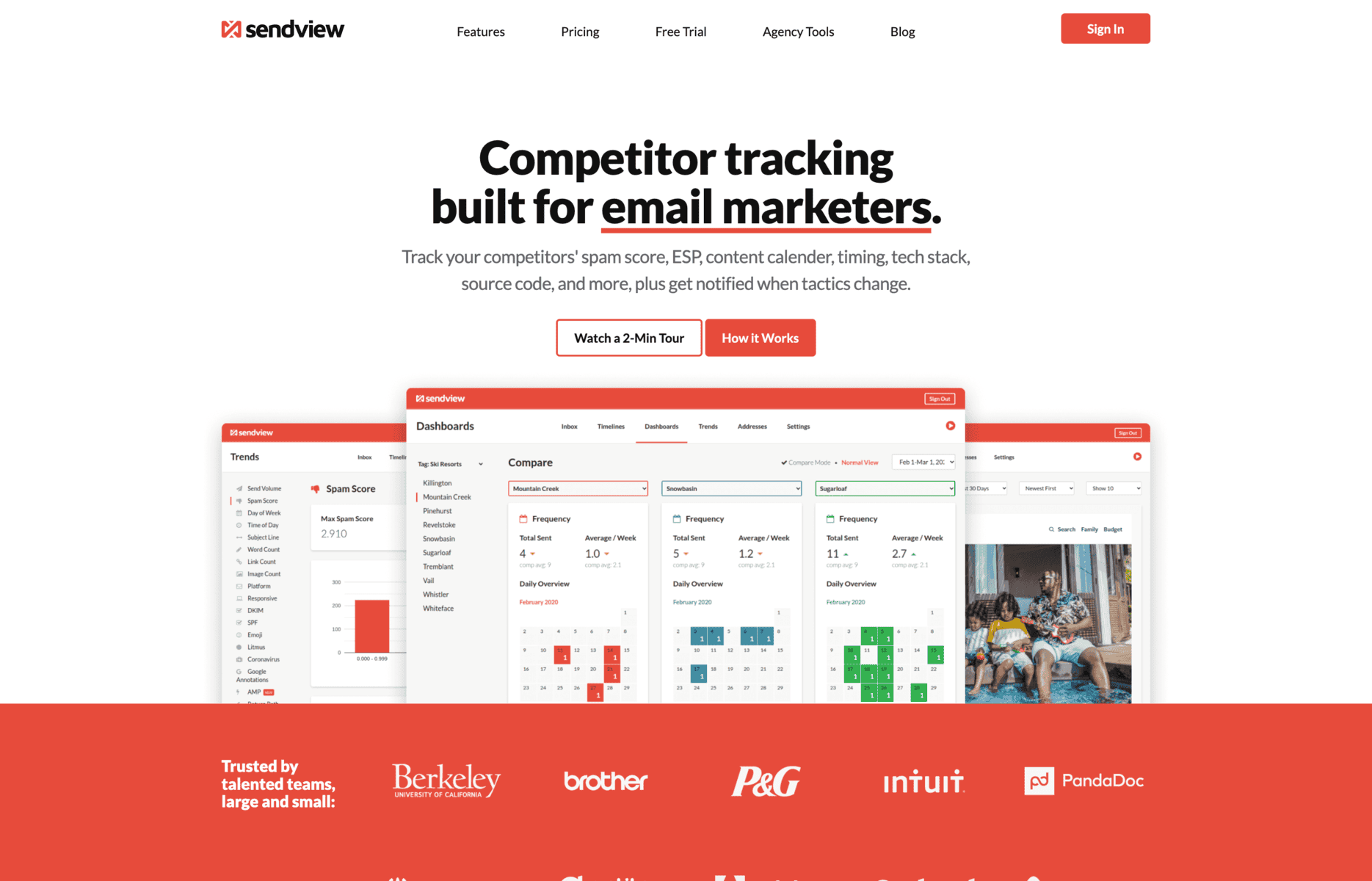
SendView is a great tool for keeping tabs on competitor email activity without deep analytics. I like how it sends custom alerts whenever a competitor changes their email frequency, design, or messaging approach. This helps me quickly adjust my own strategy without spending hours manually tracking emails. While it lacks the advanced benchmarking features of Mailcharts, it’s a solid choice for businesses that just need a simple, automated way to monitor competitor email trends.
Key Features
✔ Email campaign tracking and analysis: See how competitors structure their emails
✔ Competitor content analysis: Monitor subject lines, visuals, and calls-to-action
✔ Insights into send times and frequency: Compare how often competitors email their audience
✔ Custom email campaign alerts: Get notified when competitors change strategies
Pricing: Starts at $49 per month
Online Competitor Analysis Tool for Social Listening
Mention
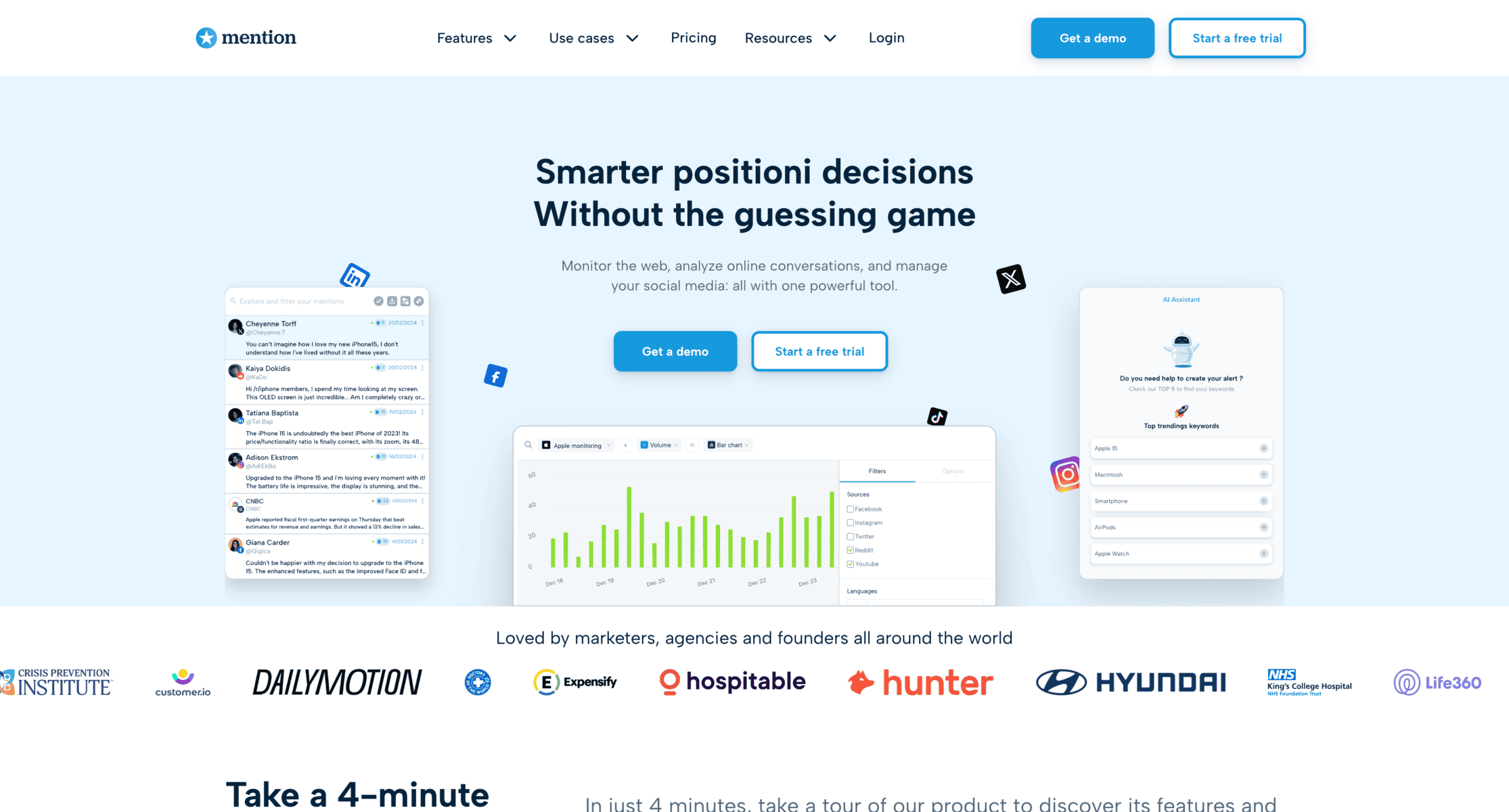
I use Mention to track competitor brand mentions across social media, blogs, and news sites. It categorizes mentions by sentiment, positive, neutral, or negative so I can instantly see how a competitor’s reputation is shifting. If a competitor is getting negative feedback, I know there’s an opportunity to highlight my strengths in that area.
One of the most useful features is its real-time alerts, which notify me whenever a competitor gets a significant mention. This helps me stay ahead of industry news before they even make announcements.
Key Features
✔ Social media and web mention tracking: Monitor competitor brand mentions across multiple platforms
✔ Sentiment analysis and insights: Quickly assess competitor reputation shifts
✔ Competitor performance benchmarking: Compare brand visibility and engagement levels
✔ Automated real-time alerts: Get notifications on major competitor mentions
Pricing: Starts at $29 per month
Talkwalker
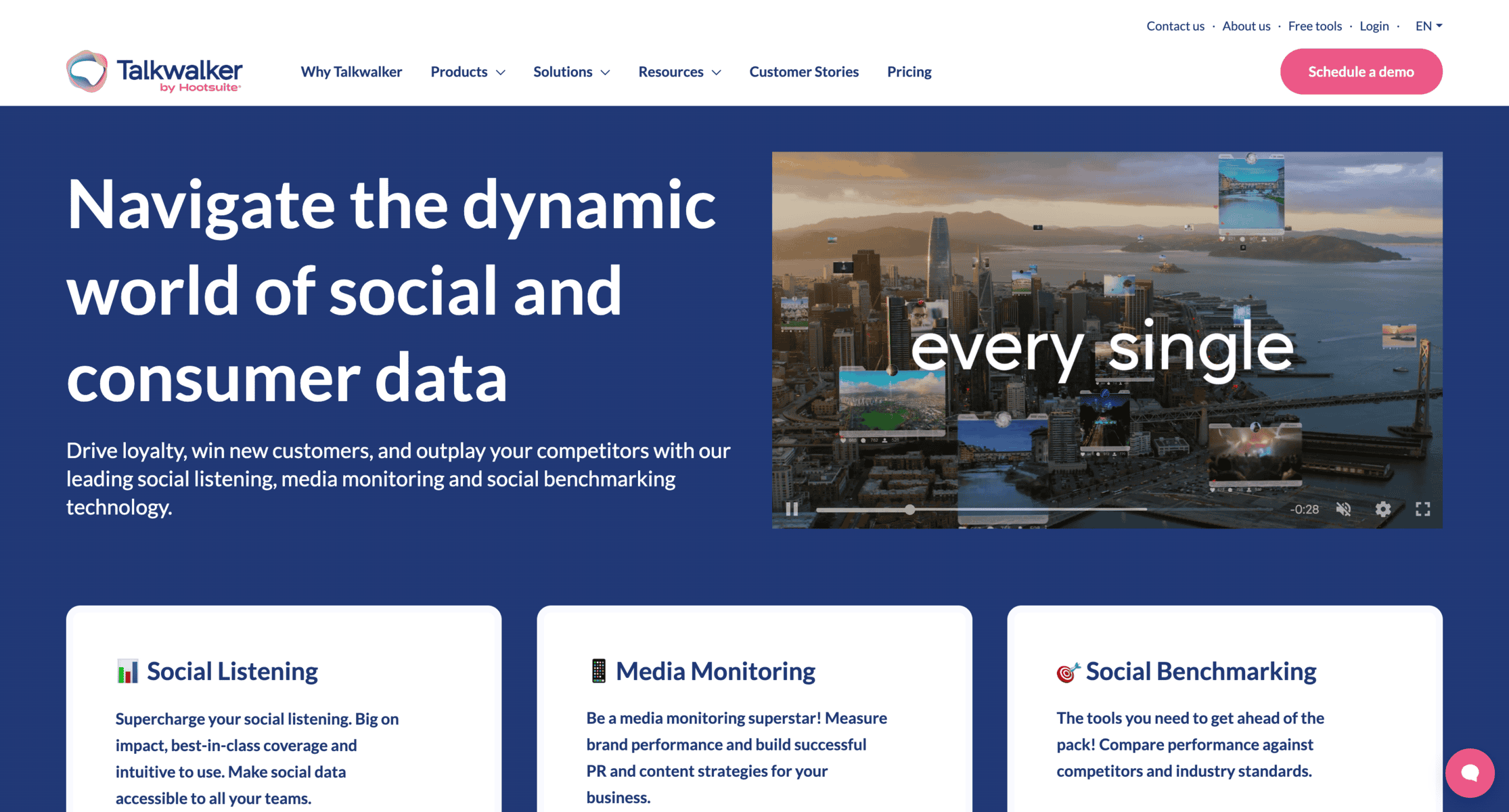
Talkwalker is the tool I turn to whenever I need more than just real-time mentions. It tracks brand sentiment, emerging trends, and industry discussions across social media, blogs, and forums. The trend monitoring feature helps predict which topics are gaining momentum, allowing me to create content before competitors do.
Unlike Mention, which focuses on short-term insights, Talkwalker provides a big-picture view of industry shifts and how competitors are positioning themselves. It’s a great tool when I need to look beyond individual mentions and understand the broader competitive landscape.
Key Features
✔ Social listening and competitor analysis: Track competitor brand mentions across different platforms
✔ Sentiment analysis and trend monitoring: Identify positive, negative, and neutral mentions
✔ Multi-platform tracking: Monitor competitors on social media, blogs, news sites, and forums
✔ Real-time alerts for competitor mentions: Stay ahead of competitor reputation shifts
Pricing: Custom (Contact for details)
BrandMentions
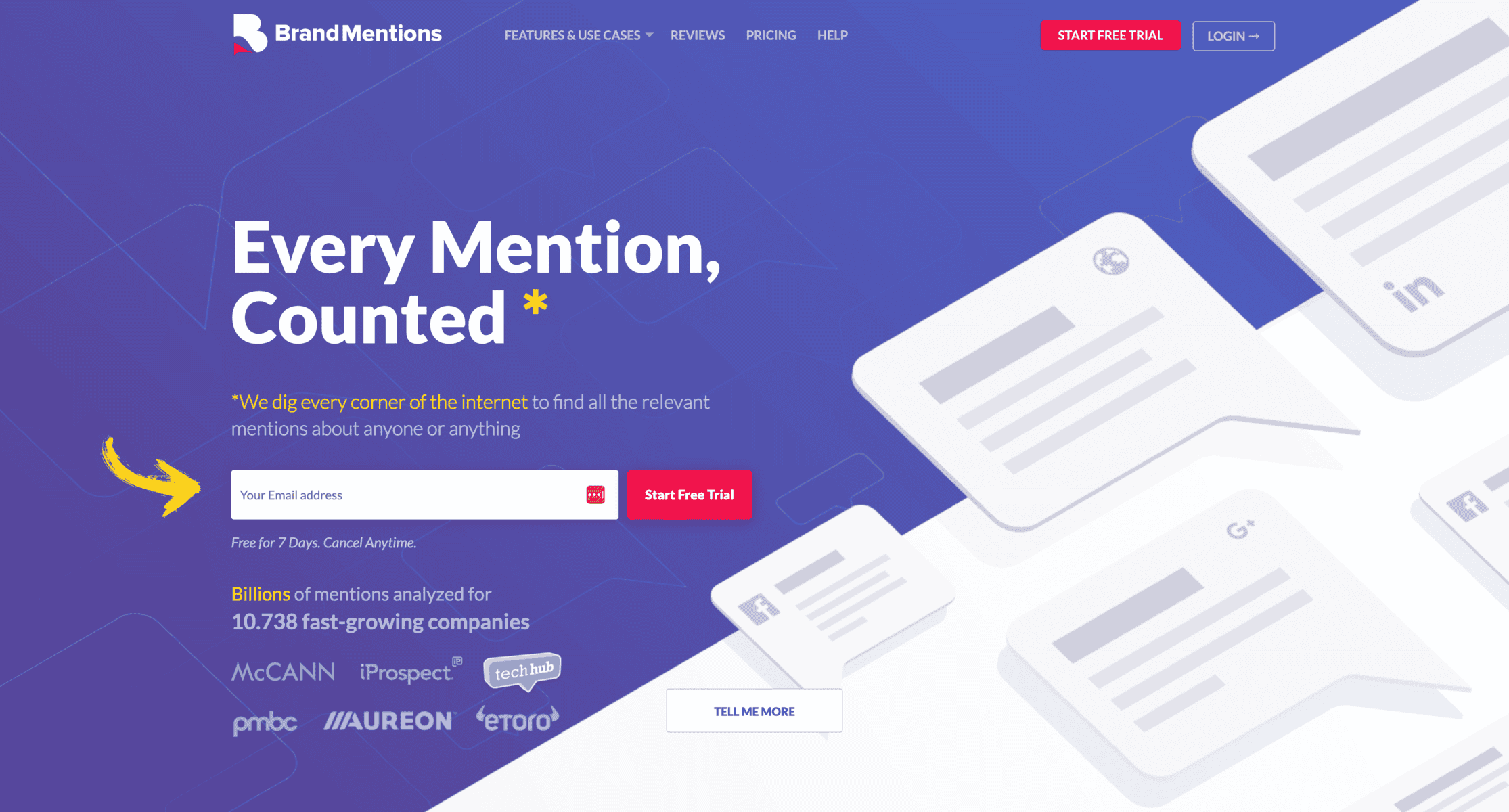
I use BrandMentions when I need a complete view of how competitors are being discussed, not just on social media, but also across PR coverage, influencer marketing, and customer discussions. It’s great for spotting brand perception shifts before they become major issues.
One feature I really like is its ability to track industry influencers. If a competitor is getting attention from key figures in my niche, I can quickly identify who those influencers are and start building my own relationships with them.
Key Features
✔ Social listening capabilities: Track competitor mentions beyond social media
✔ Competitor post monitoring: Analyze content that drives engagement
✔ Sentiment analysis: Understand public perception of competitors
✔ Brand conversation tracking: Monitor influencer and customer discussions
✔ Real-time online reputation management: Get alerts for PR and industry trends
Pricing: Starts at $79/month for 15 competitive keywords
Competitor Benchmarking Tools for Website Traffic
Similar Web
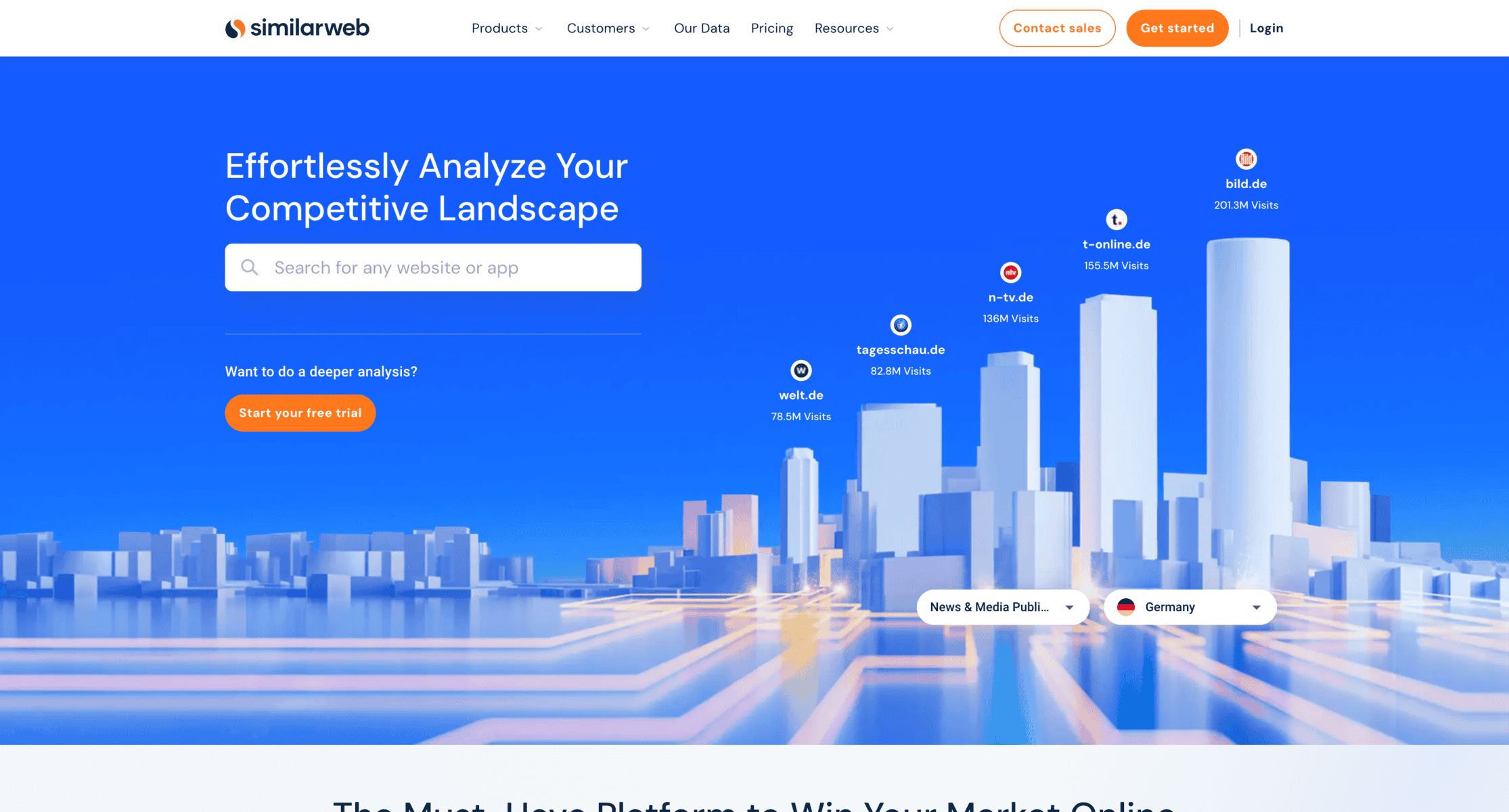
I use SimilarWeb when I need a clear breakdown of competitor website traffic sources. It reveals where competitors are getting their visitors from direct traffic, referrals, search, or social media. The audience demographic data is another standout feature, showing geographic locations and user behavior patterns.
One thing I like is its popular content tracking, which helps spot which competitor pages get the most traffic. This makes it easier to find content gaps and optimize my own strategy to attract similar audiences.
Key Features
✔ Website traffic analysis: Understand where competitors’ traffic comes from
✔ Traffic source insights: Identify search, social, and referral trends
✔ Audience demographics: See location and behavioral data
✔ Popular content tracking: Find competitor pages driving the most engagement
Pricing: $125/month
SEMrush Traffic Analytics
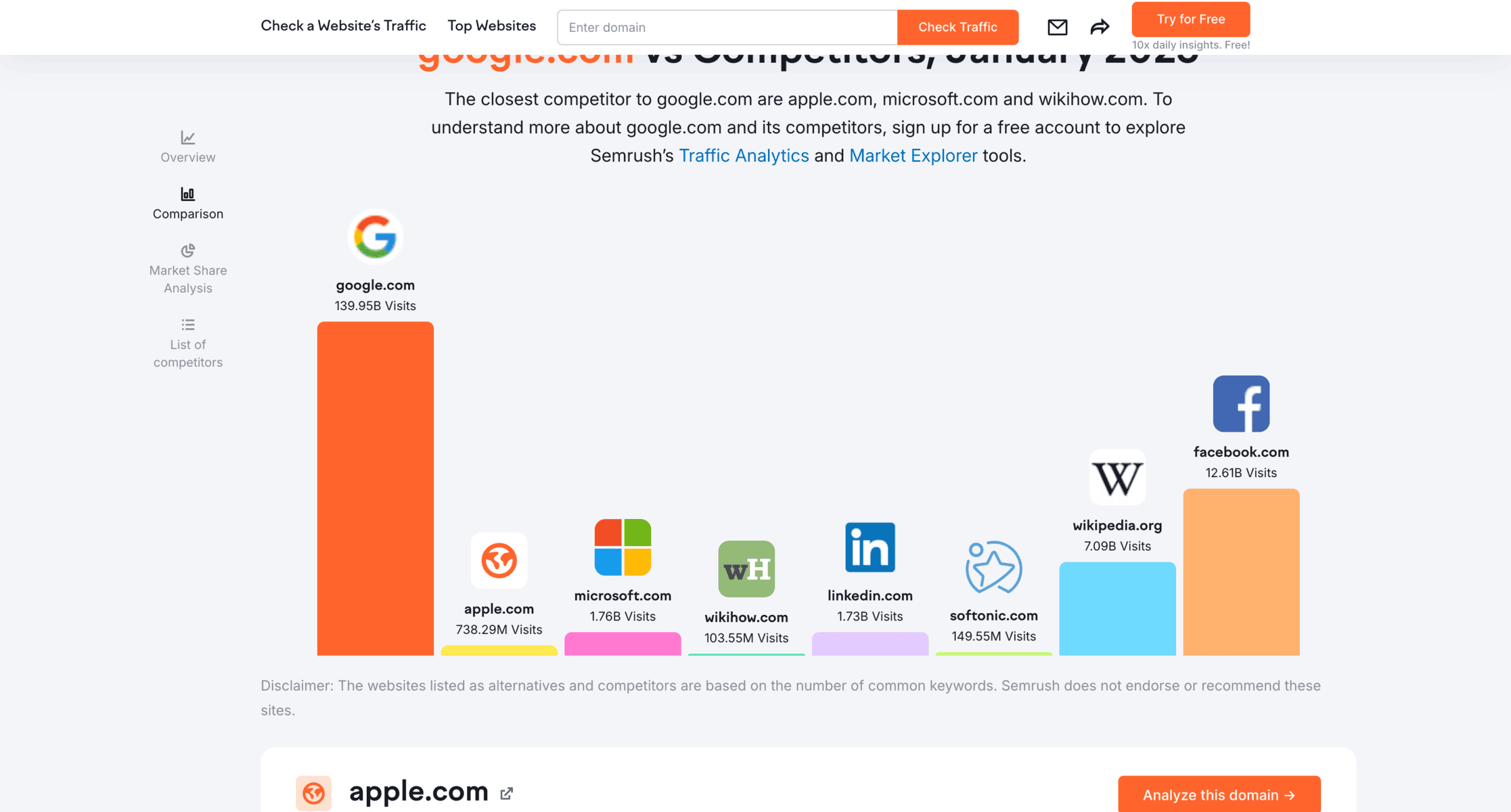
SEMrush Traffic Analytics is a must-have when I want to compare traffic trends between multiple competitors. It breaks down traffic sources, engagement metrics, and audience demographics to show which channels bring in the most valuable visitors.
What I like most is the traffic share comparison, which lets me see how much of the market competitors control versus my own site. This is so useful for understanding which competitors are growing and which are losing traction.
Key Features
✔ Traffic insights and source breakdown: Analyze where competitors get their visitors
✔ Audience demographic analysis: Understand customer behavior
✔ Competitor comparison and traffic share metrics: Measure market presence
✔ SEO performance and marketing strategy insights: Track how competitors grow their traffic
Pricing: Starts from $139.95 per month
Competitive Analysis Tools for Website Updates
Visual Ping
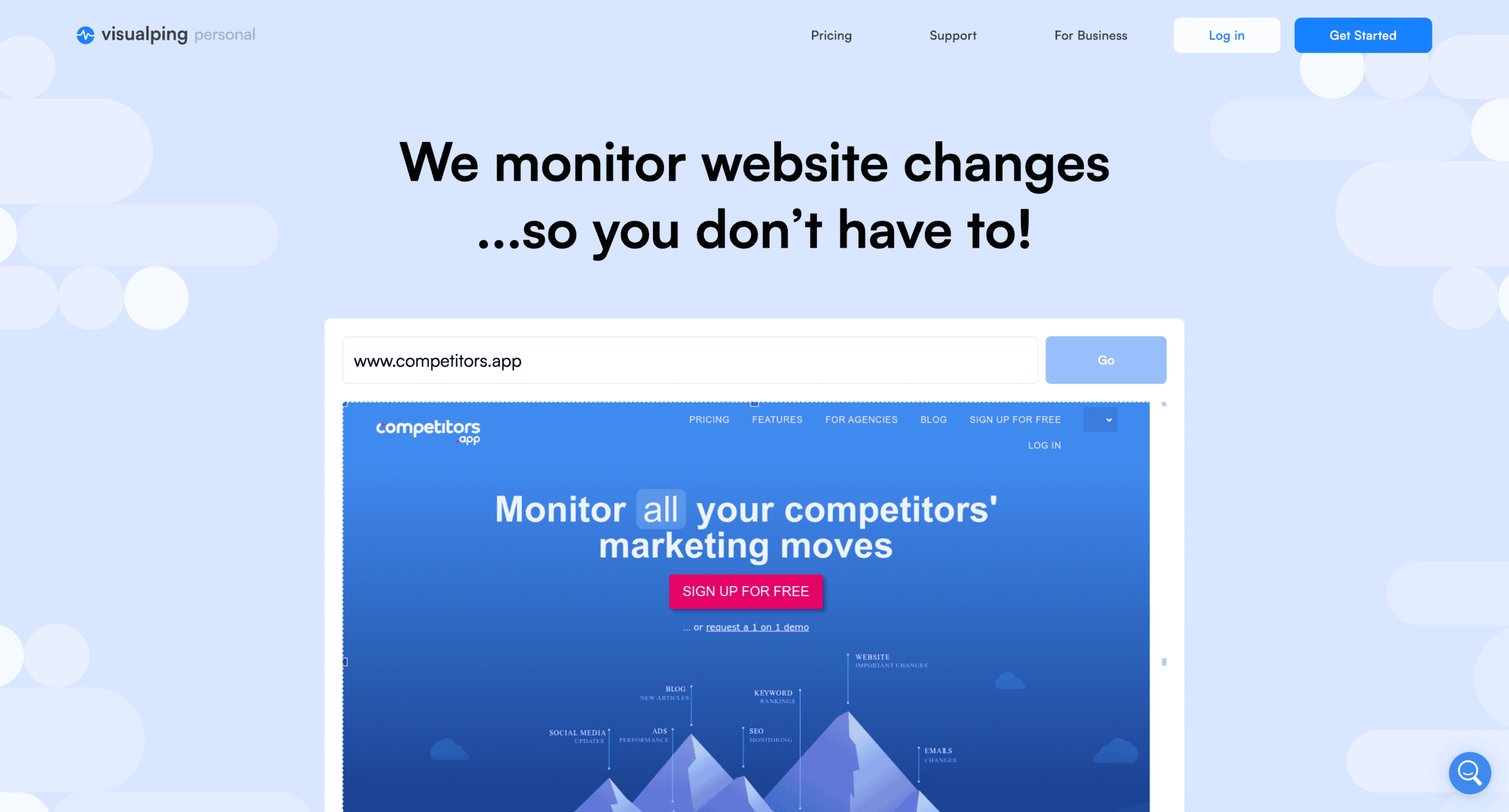
I use Visualping when I need instant alerts on competitor website changes. It tracks pricing adjustments, product launches, and content updates in real-time. This is useful for staying ahead of industry trends and making quick strategic decisions.
Unlike basic page monitors, Visualping allows me to track specific page sections, so I don’t get flooded with unnecessary alerts.
Key Features
✔ Real-time website change alerts: Get notified when competitors update their sites
✔ Industry trend monitoring: Track shifts in the market
✔ Competitor website tracking: Monitor pricing, product updates, and content changes
Pricing: Starts from $10/month for 25 pages
Distill.io
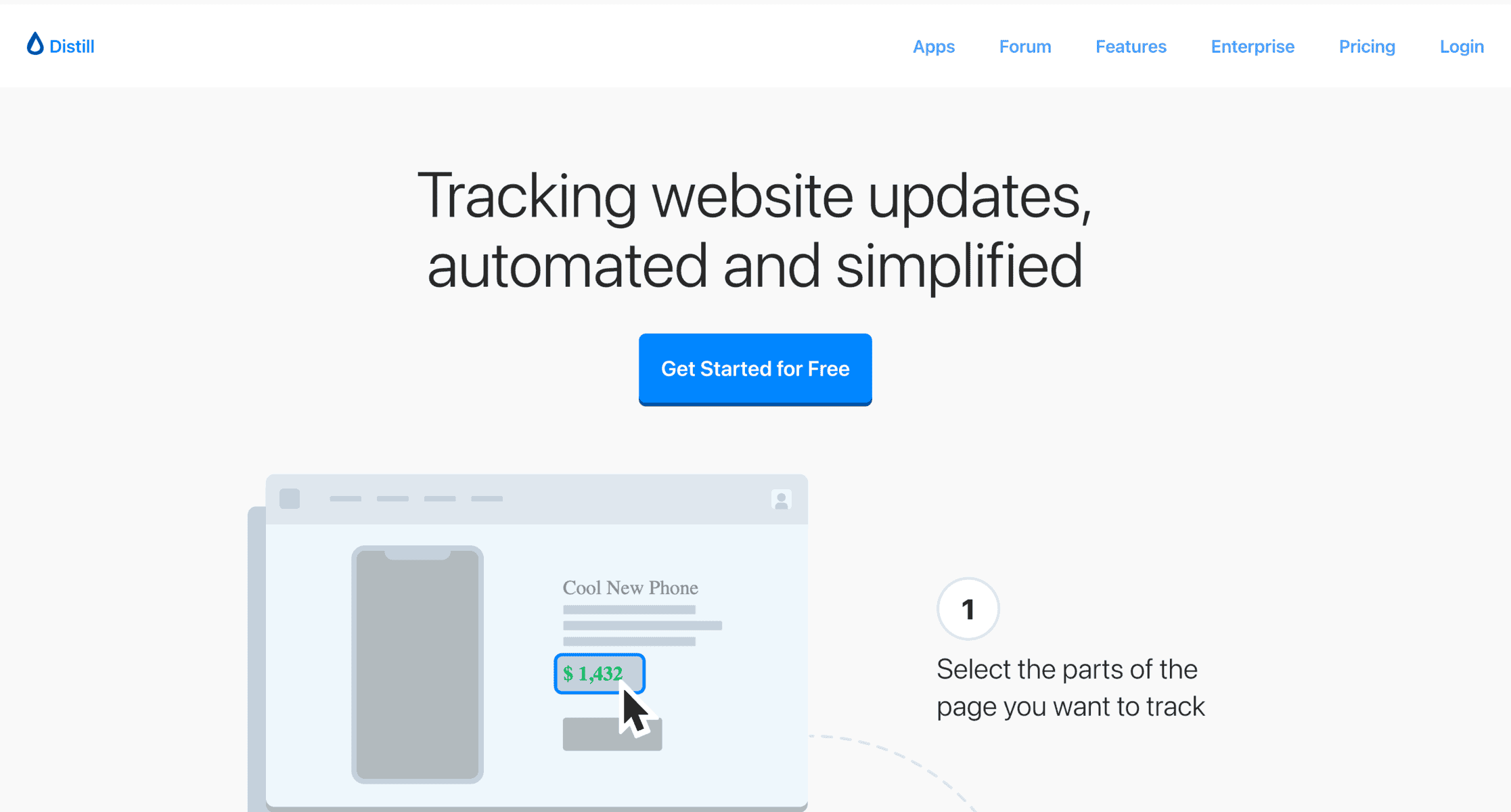
Distill.io works well for tracking competitor website changes with more control. I like that it monitors JavaScript-heavy websites, so I can track dynamic pricing and hidden content updates competitors don’t openly display.
It also provides custom notifications, making it easy to track specific competitor pages without unnecessary updates.
Key Features
✔ Tracks website changes and updates in real-time: Monitor specific competitor actions
✔ Customizable notifications: Get alerts only for important changes
✔ Supports monitoring of dynamic websites: Track updates even on JavaScript-heavy pages
✔ Works across multiple websites for competitor tracking
Pricing: Starts from $15 per month
Competitive Analysis Tools for Financial Data
Owler
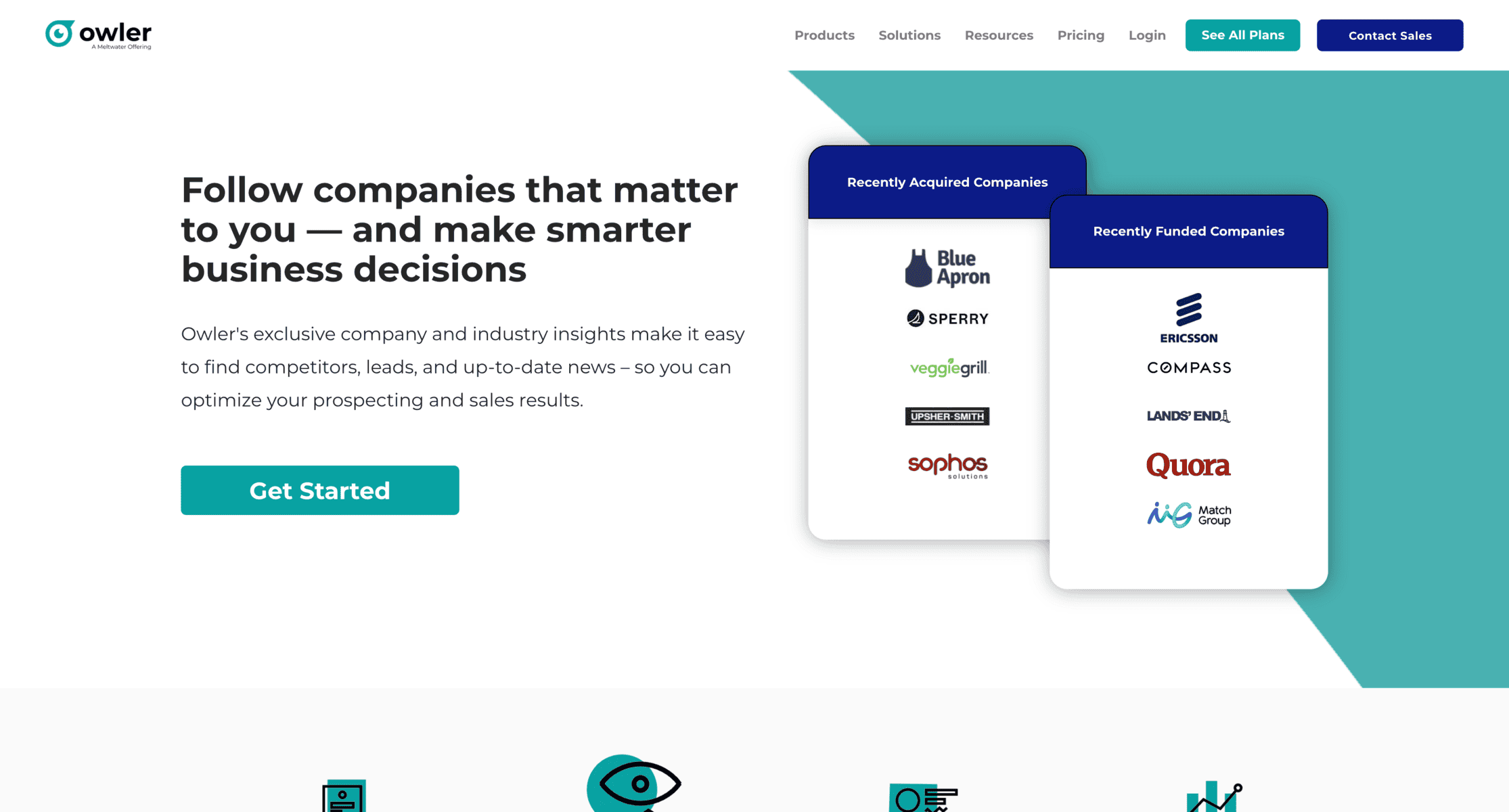
Owler is one of the fastest ways to track competitor financials without digging through reports. It provides revenue estimates, funding updates, and insights into mergers and acquisitions.
I like using Owler for tracking financial trends in my industry. If a competitor gets new funding, I can anticipate expansion plans and adjust accordingly.
Key Features
✔ Financial data insights: Track competitor revenue and performance
✔ Revenue tracking: Compare business growth over time
✔ Funding updates: Stay informed on investment rounds
✔ Competitive financial benchmarking: See how your business stacks up
Pricing: Starts from $39/month
Crunchbase
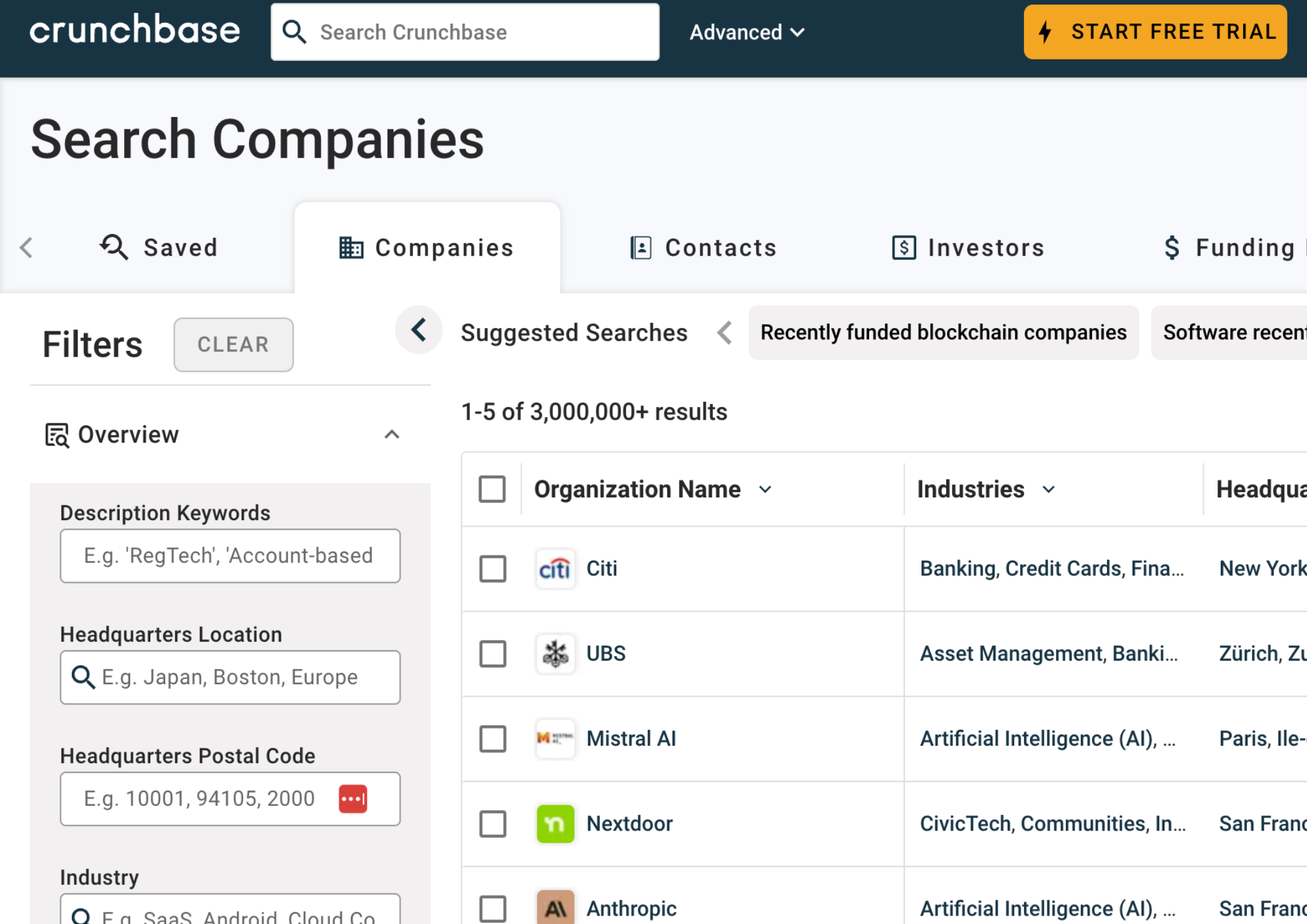
Crunchbase is my go-to tool for tracking competitor investments and acquisitions. It provides detailed funding round data, investor information, and company growth metrics.
The search filters are helpful when researching industry trends, making it easy to spot new players in the market before they become direct competitors.
Key Features
✔ Detailed company overviews with financial data: Get full competitor business profiles
✔ Tracks funding rounds, mergers, and acquisitions: See how competitors grow
✔ Insights into competitor market moves: Analyze business expansion trends
✔ Search filters for industry-specific financial insights: Find investment trends
Pricing: Free plan available; premium plans start from $29 per month
Competitor Analysis Tool for Tools Detection
BuiltWith
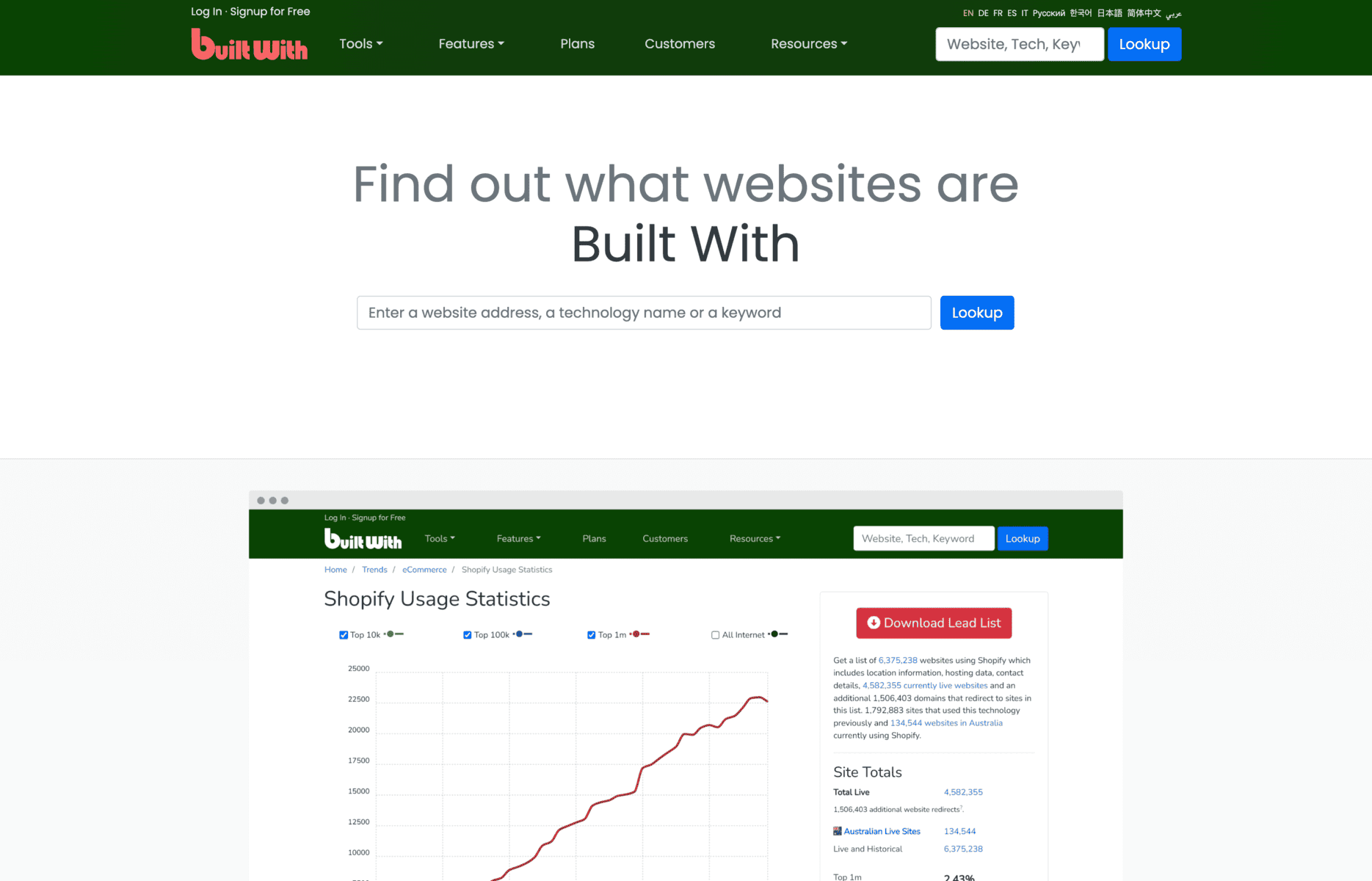
BuiltWith is the best tool for breaking down a competitor’s tech stack. It shows what CMS, eCommerce platforms, analytics tools, and marketing software competitors use.
I use it when researching which tools industry leaders rely on. It helps me decide whether to adopt similar technologies or find better alternatives.
Key Features
✔ Technology stack detection: See the tools competitors are using
✔ Competitor tech stack analysis: Understand their software and hosting providers
Pricing: Starts from $295 per month
Wappalyzer
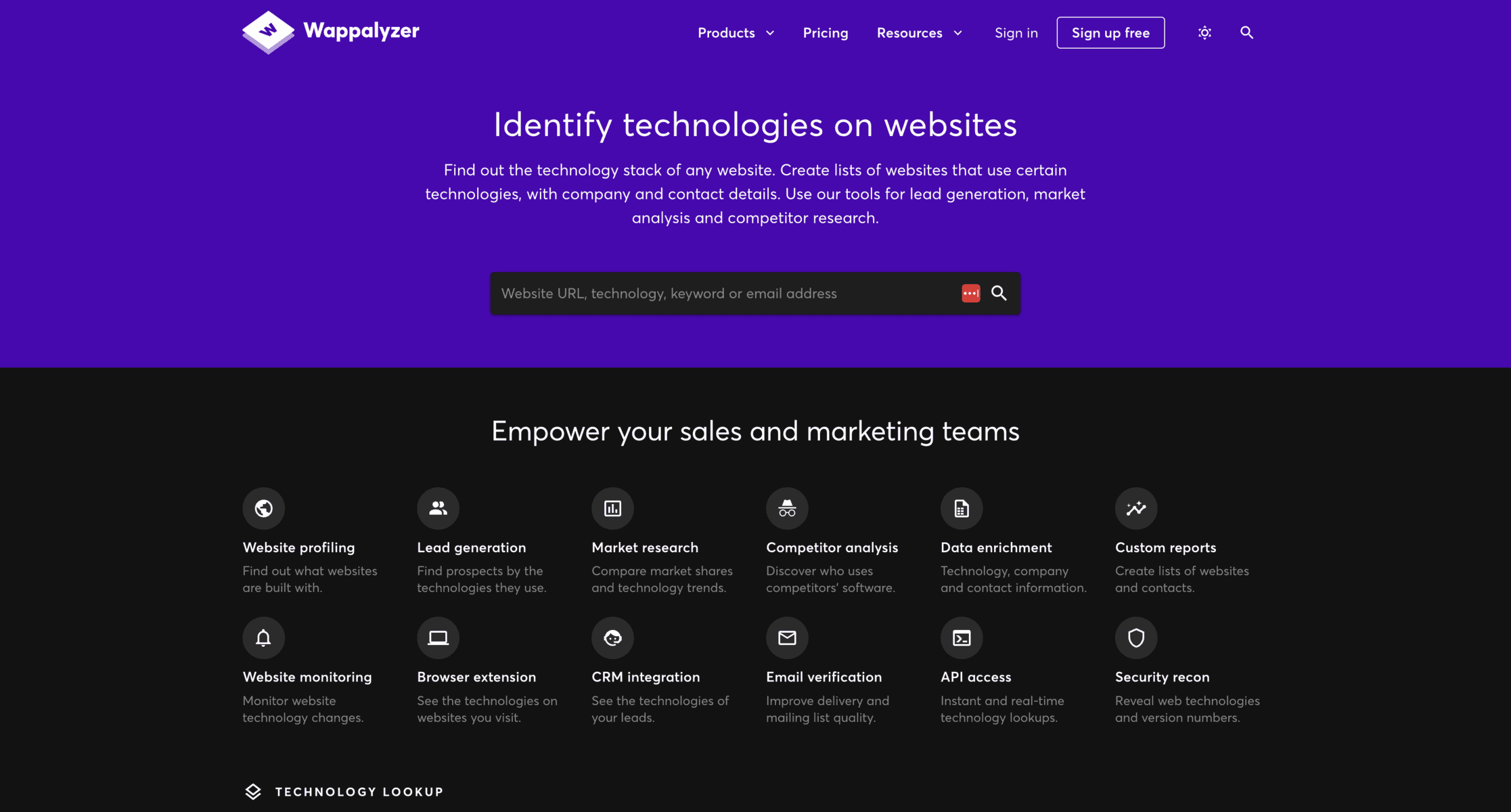
Wappalyzer is another solid tool for identifying competitor technology stacks. It provides detailed insights into frameworks, CMS platforms, and third-party integrations.
I like how it compares different competitors’ tech stacks, making it easier to spot industry-wide adoption trends.
Key Features
✔ Identifies software stacks used by competitors: Discover what powers their websites
✔ Tracks technologies, CMS, and eCommerce platforms: See how they build and optimize sites
✔ Competitor tech stack comparison: Compare different businesses in your industry
Pricing: Free plan available; paid plans start from $79 per month
Competitor Analysis Tool for Market Research
CB Insights
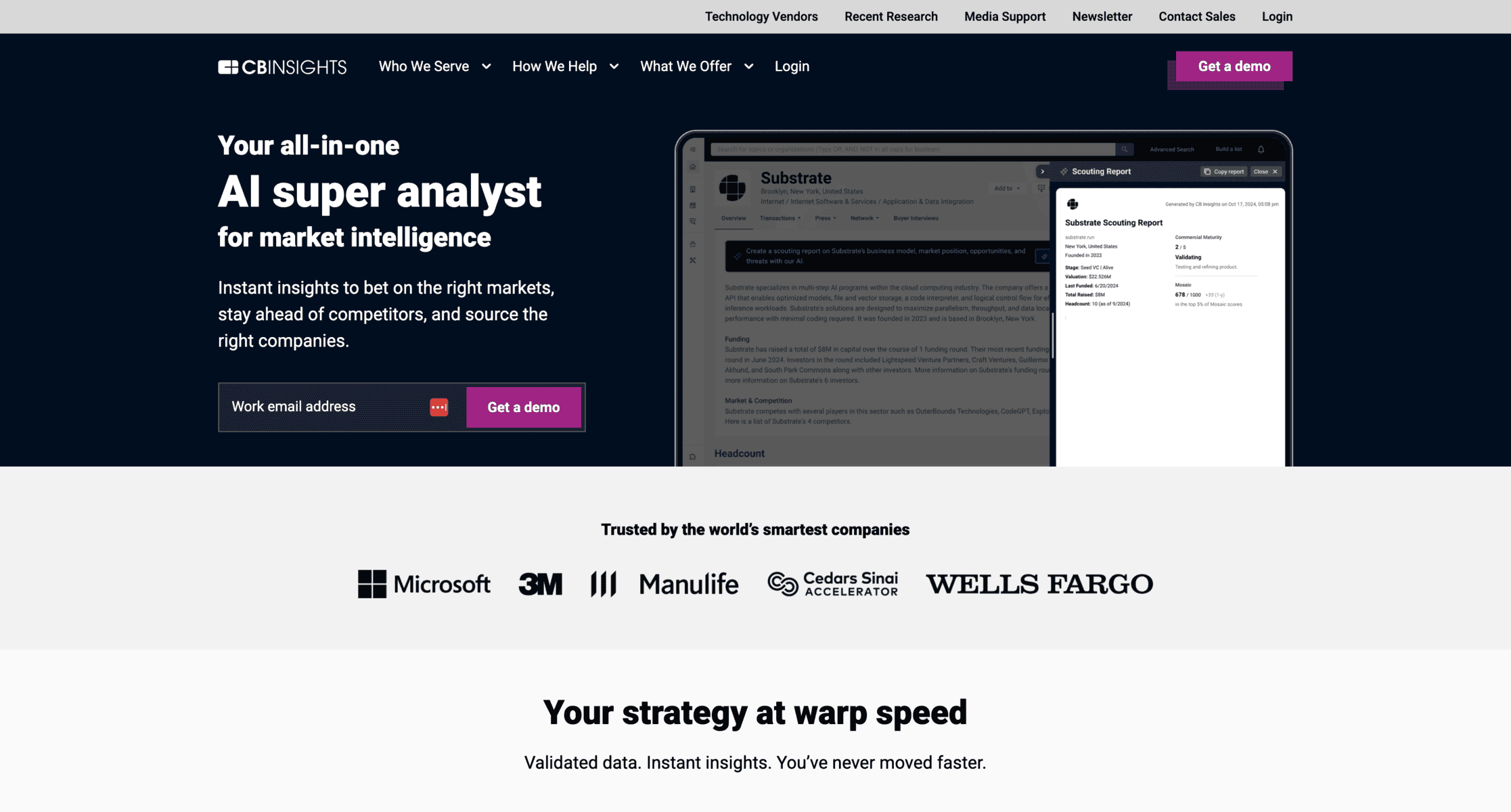
CB Insights provides detailed reports on competitors, funding rounds, and emerging market trends. I use it when I need high-level business intelligence beyond website metrics and marketing strategies.
It’s great for tracking startup ecosystems and understanding where the industry is heading.
Key Features
✔ Market research reports and competitor analysis: Get in-depth industry insights
✔ Tracks funding rounds, acquisitions, and partnerships: Follow competitor financial moves
✔ Monitors industry trends and emerging competitors: Identify new market opportunities
✔ Provides data on startup ecosystems and venture capital: Analyze investment patterns
Pricing: Custom pricing (contact for details)
Statista
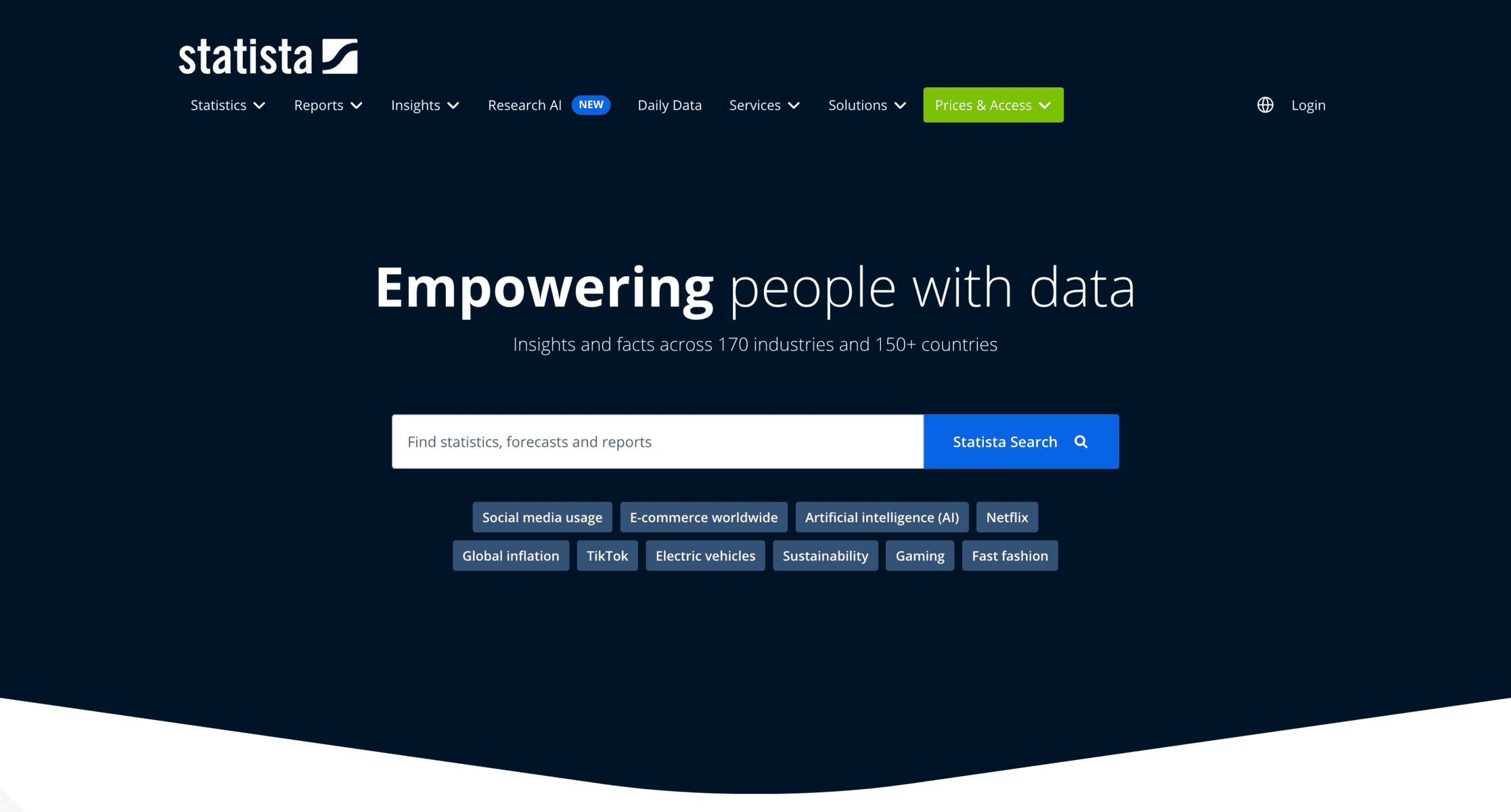
Statista is the best tool for getting raw market data. It provides competitor performance stats, industry reports, and forecasting models.
I use Statista when I need quick, reliable statistics on industry trends, especially for presentations or strategic planning.
Key Features
✔ Extensive database of market statistics and reports: Access industry data quickly
✔ Industry-specific data for competitor tracking: Analyze market trends
✔ Trend analysis and market forecasting: Predict where industries are headed
✔ Customizable industry reports and research: Get tailored data insights
Pricing: Starts from $39 per month
Competitor Analysis Tool for Content Strategy
BuzzSumo
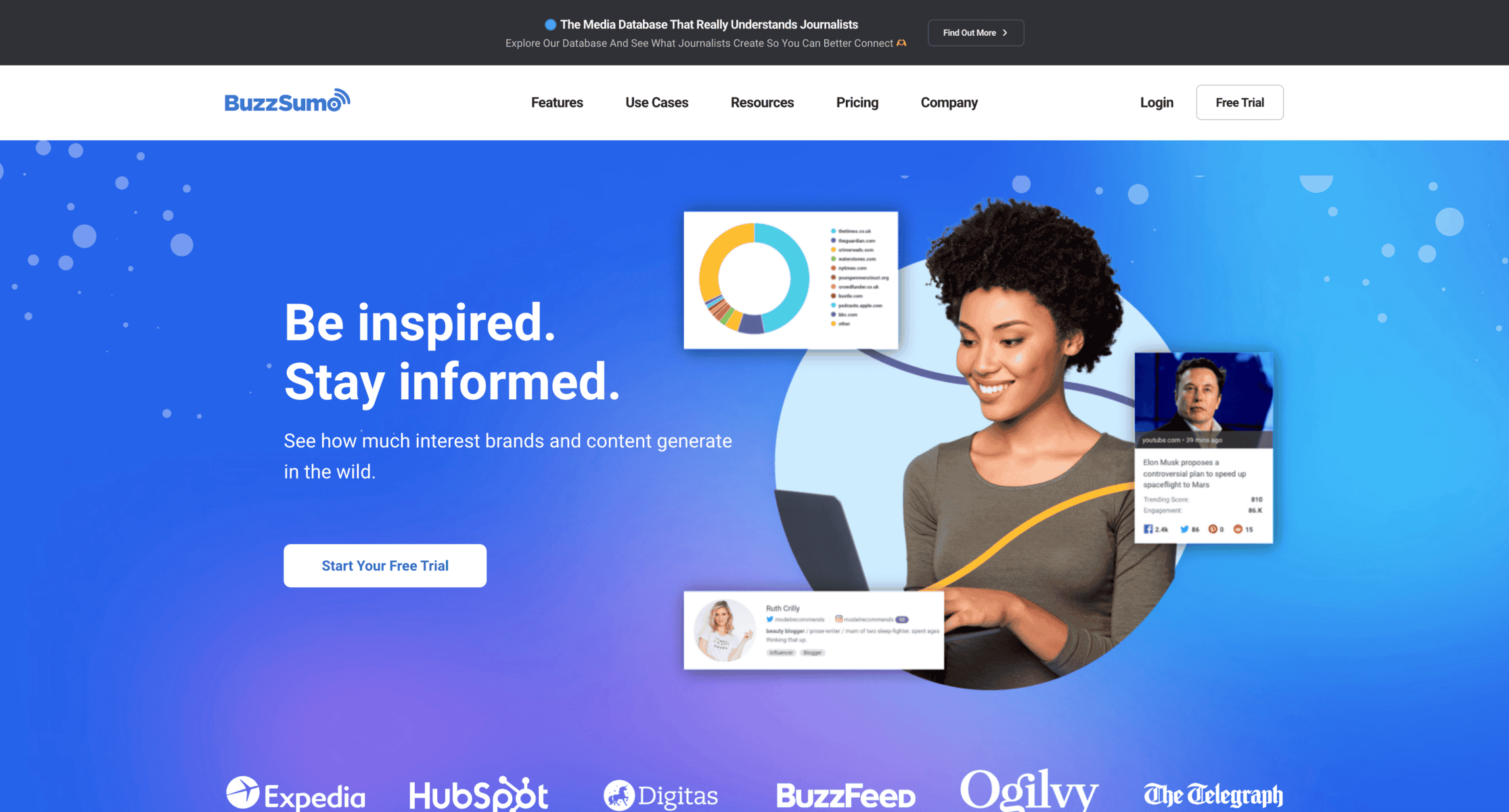
I use BuzzSumo when I need a clear picture of what content is performing best across my industry. It tracks top-performing articles, trending topics, and social media shares, making it easy to see what’s gaining traction for competitors.
One of my favorite features is competitor content benchmarking, which helps identify content gaps. If a competitor’s post is getting massive engagement, I can analyze why it worked and create something even better.
Key Features
✔ Content performance analysis and tracking: Identify which topics drive engagement
✔ Social media sharing and engagement insights: Track how competitor content spreads online
✔ Competitor content benchmarking: Compare your content to industry leaders
✔ Content ideas based on competitor performance: Find trending topics before they peak
Pricing: Starts at $99 per month
Frase
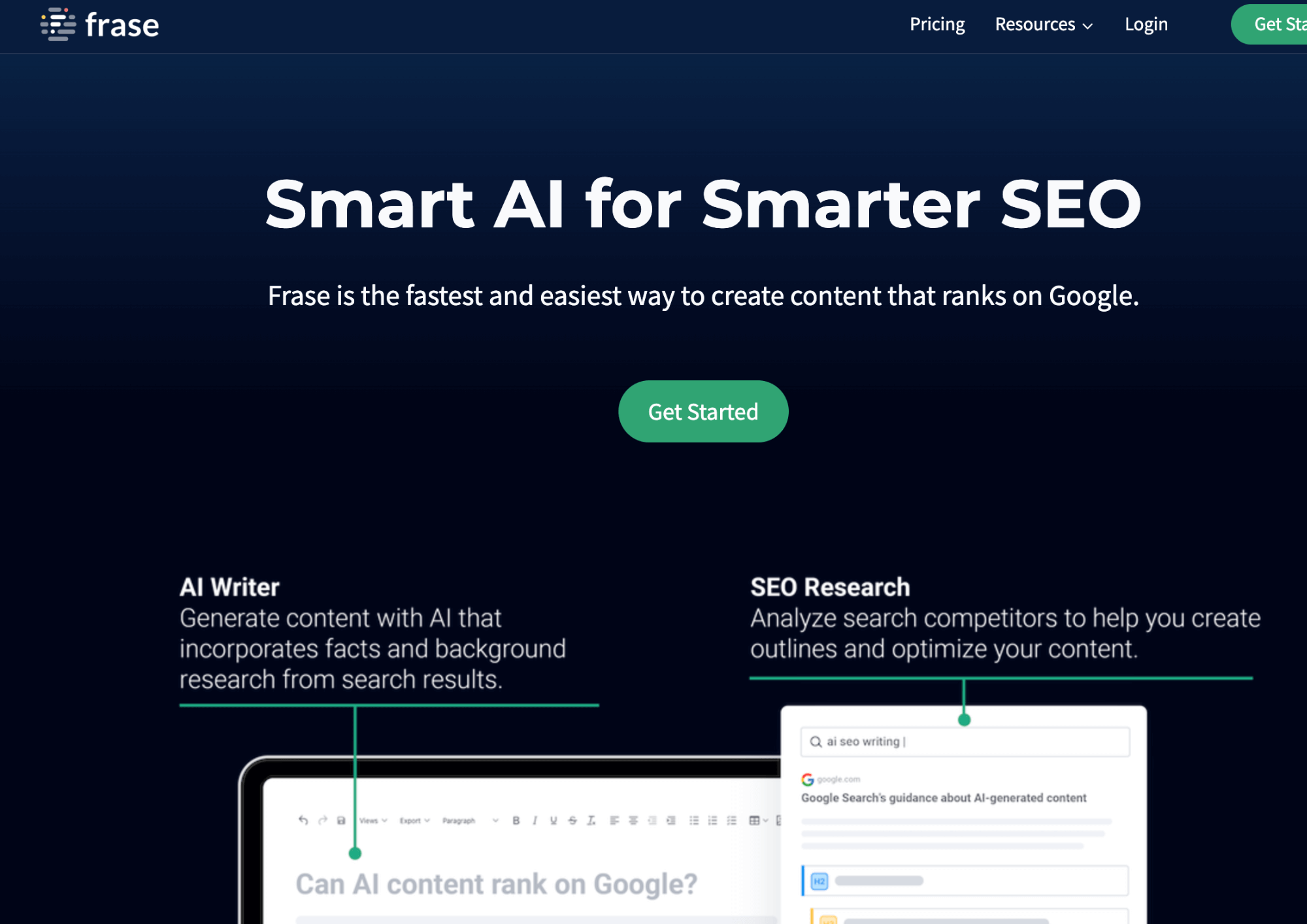
I rely on Frase when I want to improve or enhance my content research and optimization process. Unlike BuzzSumo, which focuses on content trends, Frase specializes in SEO-driven content recommendations based on competitor analysis.
One thing I like is how it summarizes competitor content structures. It saves me time by automatically pulling key points from top-ranking pages, so I don’t have to manually dissect every competitor’s article.
Key Features
✔ Content performance analysis and tracking: Get real-time insights into ranking content
✔ Social media sharing and engagement insights: Analyze content visibility across platforms
✔ Competitor content benchmarking and topic discovery: Compare how your content ranks against competitors
✔ AI-driven content suggestions: Improve SEO and optimize for better rankings
Pricing: Starts at $45 per month
Definition and Importance of Competitive Benchmarking
Competitive benchmarking compares your business performance to competitors to uncover strengths, weaknesses, and opportunities for growth. It helps identify what works in the industry, allowing businesses to set realistic goals and craft data-driven strategies that align with market trends.
Using competitive benchmarking tools, businesses can track competitor activities, customer needs, and emerging market trends to refine their approach and maintain an edge.
Benefits of Competitive Benchmarking
- Enhanced Market Understanding: Benchmarking reveals customer preferences, pain points, and industry trends, allowing for more targeted strategies.
- Strategic Differentiation: Understanding what competitors do well and where they fail makes it easier to stand out with a stronger value proposition.
- Data-Driven Decisions: Competitive benchmarking provides actionable insights for refining pricing, product development, and marketing.
- Improved Efficiency: Learning from competitors helps adopt proven strategies while avoiding costly mistakes.
- Fostering Innovation: Identifying gaps in competitors’ offerings leads to new solutions and product innovations that address unmet market needs.
- Competitive benchmarking isn’t about copying competitors, it’s about learning from their successes and failures to make smarter business moves.
Types of Competitive Benchmarking and Analysis
SEO Competitive Benchmarking
This involves analyzing competitors’ search engine optimization (SEO) efforts to improve your own rankings by:
- Identifying Keyword Opportunities: Discovering valuable keywords competitors rank for.
- Evaluating Content Optimization: Benchmarking competitors’ content structure and metadata for better visibility.
- Analyzing Backlink Profiles: Identifying high-quality backlink sources used by competitors.
Social Media Benchmarking
Social media benchmarking helps evaluate competitors’ engagement and reach, enabling improvements in your own social media strategy by:
- Analyzing Content Performance: Identifying successful posts and engagement patterns.
- Tracking Influencer Collaborations: Benchmarking partnerships that drive engagement for competitors.
- Optimizing Ad Campaigns: Understanding competitors’ ad formats and targeting strategies.
Content Marketing Benchmarking
This involves evaluating competitors’ content marketing activites to identify areas for improvement and differentiation by:
- Assessing Content Formats: Comparing the effectiveness of different content types, such as videos or infographics.
- Identifying Content Gaps: Spotting topics competitors haven’t covered to create unique, value-driven content.
- Optimizing Distribution Channels: Benchmarking how competitors distribute content for better audience reach.
By incorporating competitive benchmarking into broader efforts, businesses can set performance standards, identify improvement opportunities, and strategically position themselves for long-term success.
Why Competitor Analysis Tools Are a Must-Have
Now, let’s shift our focus to the benefits of utilizing competitor analysis tools. These tools provide you with a wealth of advantages, giving you an edge in the race to outperform your rivals. Whether you’re a small business owner looking to gain market share or a marketing professional striving for better campaign outcomes, these benefits are too significant to ignore.
Identify Market Opportunities
Discover untapped markets, keyword gaps, and new trends that can give you a competitive edge. By tracking where your competitors are trying to target, you gain valuable insights that help you identify blue oceans and earn significant market share. Competitor analysis features help track multiple dimensions of competitor strategies, including social media activities, website modifications, and AI utilization.
Anticipate New Trends
Stay ahead of the curve by predicting industry trends and consumer behavior shifts. By reading consumer reviews or social listening you will be able to understand what your or competitor customers want and build that ahead of them.
Benchmark Performance
Compare your performance against competitors and set benchmarks for growth. Here is an example of how the Competitors App helps you benchmark yourself against the competition with an easy image.
Uncover SEO strategies, keyword rankings, and backlink opportunities that boost your online visibility. Using an SEO competitor analysis tool, you can conduct keyword research, backlink analysis, and monitor competitors’ marketing strategies to enhance your website’s SEO performance.
Enhance Marketing
Optimize your marketing efforts by studying what works for others. Imagine knowing how your competitors run ads, which channels they use, and what they are messaging is. How easy would it be for you to enter the market?
Track Changes
What if I told you that your competitors are doing more than 100 marketing moves per month? How valuable would it be to know the best of them? With these analysis tools, you are able to keep an eye on your competition’s strategies and adapt to them in real-time.
Win Competitive Deals
Did you know that you lose 20-50% of your customers to competition? Competitor tracking tools are helping you stay on top of customers and be ready to respond when they consider switching.
What Should You Look for in Competitor Analysis Tools?
The ideal competitor analysis tool should offer a competitive advantage by providing the following features:
Wide Range of Data
Access to a wide array of data sources, from SEO performance to social media analytics.
Real-time Monitoring
The ability to track competitors’ changes as they happen.
User-Friendly Interface
An intuitive dashboard that simplifies the process of collecting insights. There are many tools out there that
Competitor Benchmarking
This allows you to understand what your competitors are doing and how you benchmark against them. For example, a social media manager would like to know how frequently the competitors post vs how frequently he posts. Similarly, the engagement rates they get and the followers.
Comprehensive SEO Analysis
Look for tools that provide detailed reports on backlinks, keywords, and on-page SEO. Understanding how your competitors rank for different search terms and which backlinks drive their traffic can help you develop more targeted strategies.
Social Media Tracking and Analysis
A solid tool should track your competitors’ activities across platforms like LinkedIn, Facebook, Instagram, and Twitter. This includes insights into their post frequency, engagement rates, follower growth, and the type of content that resonates with their audience.
Ad Campaign Monitoring
Keep an eye on your competitors’ ad strategies, including Google Ads, Facebook, Instagram, and LinkedIn campaigns. This will help you understand where they are investing their budget, what messaging works for them, and how effective their ad placements are.
Reviews and Reputation Tracking
Analyzing customer reviews can reveal common pain points or areas where your competitors excel. Tools that offer reviews tracking across platforms like Google, Yelp, and industry-specific sites give you insights into customer satisfaction and brand perception.
Email Campaign Tracking
Some tools can track your competitors’ email marketing campaigns, giving you insights into their frequency, open rates, and content strategy. This can help you refine your own email outreach or automation efforts.
Social Listening and PR Monitoring
In today’s world, brand perception is vital. Tools that offer social listening and PR news monitoring can help you stay updated on what people are saying about your competitors in real-time. Whether it’s tracking mentions, sentiment, or industry trends, this information can shape your overall strategy.
Competitor Websites Analysis
Tools that allow you to analyze competitor websites for insights into their SEO and PPC strategies, website changes, technology stacks, and overall marketing tactics by entering their URLs.
Choosing the Right Competitor Analysis Tool
With so many competitor analysis tools available, choosing the right one can be overwhelming. Here are some factors to consider when selecting a competitor analysis tool:
Factors to Consider
- Features: Consider the competitive analysis features you need to analyze your competitors, such as SEO analysis, social media monitoring, email marketing analysis, and competitor research.
- Ease of use: Choose a tool that is easy to use and navigate, even for those without extensive technical expertise.
- Data accuracy: Ensure that the tool provides accurate and up-to-date data about your competitors.
- Customization: Consider a tool that allows you to customize your analysis to fit your specific business needs.
- Pricing: Evaluate the cost of the tool and ensure it fits within your budget.
- Integration: Consider a tool that integrates with other marketing tools and platforms you use.
- Customer support: Choose a tool with reliable customer support in case you need assistance.
What type of tools can be used for competitor analysis?
When diving into competitor analysis, you’ll encounter an arsenal of specialized tools, each tailored to a distinct facet of your research. Here’s a closer look at how each category of tools can offer insights and elevate your understanding of your competitors:
|
SEO Tools |
These tools are your portal to dissecting your rivals’ online presence. By analyzing their SEO strategies, SERP results, and backlinks, you can discover their strengths and weaknesses in the digital landscape. This information empowers you to refine your own SEO strategy, enhance visibility, and optimize content to outrank the competition. |
|
Social Media Analysis Tools |
In the age of social media dominance, analyzing your competitors social media and how they engage with their audience is crucial. These tools provide in-depth insights into their social media performance, content marketing tactics, and audience demographics. Armed with this knowledge, you can fine-tune your social media approach, increase engagement, and gain a competitive edge in the digital space. |
|
PPC Analysis Tools |
Pay-per-click advertising is a dynamic battleground, and these tools equip you with the means to decode your competitors’ PPC strategies. You can uncover their ad campaigns, keyword selections, and messaging. This information helps you make data-driven decisions to optimize your PPC campaigns, reduce ad spend, and maximize ROI. |
|
All-in-One Analysis Tools |
For a comprehensive approach, these tools cover multiple aspects of competitor analysis. They provide a holistic view of your rivals’ strategies, combining SEO, social media, PPC, website changes, and email insights into one platform, streamlining your competitive research. You can review the effectiveness of these tools in depth. |
|
Website Traffic Analysis Tools |
These tools shed light on the web traffic patterns of your competitors, revealing their sources of traffic, audience demographics, and popular content. By understanding their web traffic, you can refine your content and SEO strategies to drive more visitors to your site. |
|
Sales Battlecards Tools |
When you need to outshine your competitors in the sales arena, these tools offer the upper hand. They provide valuable insights into your rivals’ sales tactics, enabling you to create battlecards that empower your sales team with key competitive information. |
|
Competitor Technology Detection Tools |
In a tech-savvy landscape, understanding the tools and technologies your competitors use is pivotal. These tools unveil the software, platforms, and technologies adopted by your rivals, allowing you to make informed technology choices to gain a competitive edge. |
|
Website Changes Detection Tools |
To stay current, understanding your competitors’ website modifications or new pages is essential to understand how they adapt to the market or what new products or features they launch. Website change tools monitor these adjustments and alert you in real time. |
|
Email Monitoring Tools |
Your competitors’ email marketing strategies are no longer a mystery with these tools. They track email campaigns, offering insights into content, delivery, and audience engagement. Armed with this information, you can fine-tune your own email marketing efforts for superior results. |
|
Brand Mention Tools |
This category of tools extends your reach into the realm of social media by tracking not only your competitors‘ posts and engagement but also the conversations and sentiments surrounding their brand. Social listening tools offer insights into public perceptions and emerging trends. At the same time, many social listening tools allow you to track your competitor top PR News and Brand Mentions. |
This comprehensive analysis equips you to adapt your strategies and surpass your competitors, making each of these tools a valuable asset in your competitive toolkit.
How to Use Competitor Analysis Tools Effectively
To get the most out of competitor analysis tools, follow these best practices:
Best Practices for Competitive Analysis
- Set clear goals: Define what you want to achieve through competitor analysis, such as identifying market gaps or improving your own marketing strategy.
- Choose the right tools: Select tools that align with your goals and provide the features you need.
- Analyze multiple competitors: Analyze multiple competitors to gain a comprehensive understanding of the market.
- Monitor regularly: Regularly monitor your competitors’ strategies and adjust your own strategy accordingly.
- Use data to inform decisions: Use data from competitor analysis to inform your marketing decisions and improve your strategy.
- Stay up-to-date: Stay up-to-date with the latest market trends and competitor strategies to stay ahead of the competition.
- Integrate with other marketing tools: Integrate competitor analysis tools with other marketing tools and platforms to streamline your marketing strategy.
Frequently Asked Questions About Competitor Analysis Tools
Why is competitor tracking and analysis critical for brands?
Competitor tracking and analysis are essential for brands because they provide valuable insights into the market landscape. Understanding your competitors’ strategies, strengths, and weaknesses helps you make informed decisions, stay competitive, and identify opportunities for growth. It allows you to adapt your own strategies, improve product offerings, and enhance your market positioning.
How can data analytics tools help businesses?
Data analytics tools empower businesses by turning raw data into actionable insights. These tools can help identify trends, customer preferences, and market opportunities. They enable data-driven decision-making, enhance operational efficiency, and improve overall performance. In the context of competitive analysis, data analytics tools provide the necessary data to assess and refine your competitive strategies.
What are the best tools for competitive analysis?
The best tools for competitive analysis can vary depending on your specific needs and industry. Some popular options include SEMrush, Ahrefs, Moz, SpyFu, and, of course, Competitors App. These tools offer a range of features for tracking competitors’ SEO, social media, PPC, and more. To determine the best fit, consider your objectives, budget, and the depth of insights you require.
What is the best free competitive analysis tool?
For those looking for free competitive analysis tools, Google Trends and Google Alerts are useful options. Google Trends provides insights into keyword trends, while Google Alerts can notify you of mentions and updates related to your competitors. Keep in mind that while these tools are free, they may have limitations compared to paid options. At the same time, you can sign up for free trials in tools like Competitor App to get an overview of potential insights and then decide if you want to keep using them.
How to use competitive analysis tools?
Using competitive analysis tools involves several steps. First, define your competitors and set clear objectives for your analysis. Then, choose the appropriate tools that align with your goals, whether it’s SEO, social media, PPC, or a holistic approach. Collect data on your competitors’ activities and use the insights to refine your own strategies, improve product offerings, and enhance your market presence.
